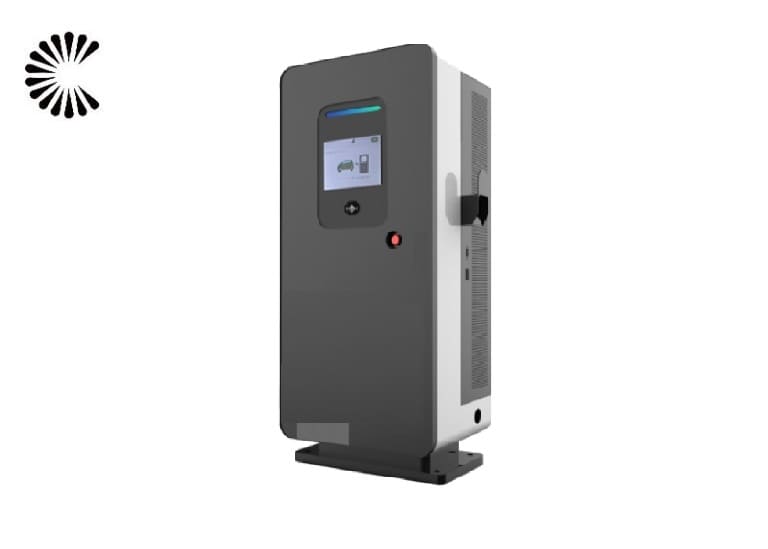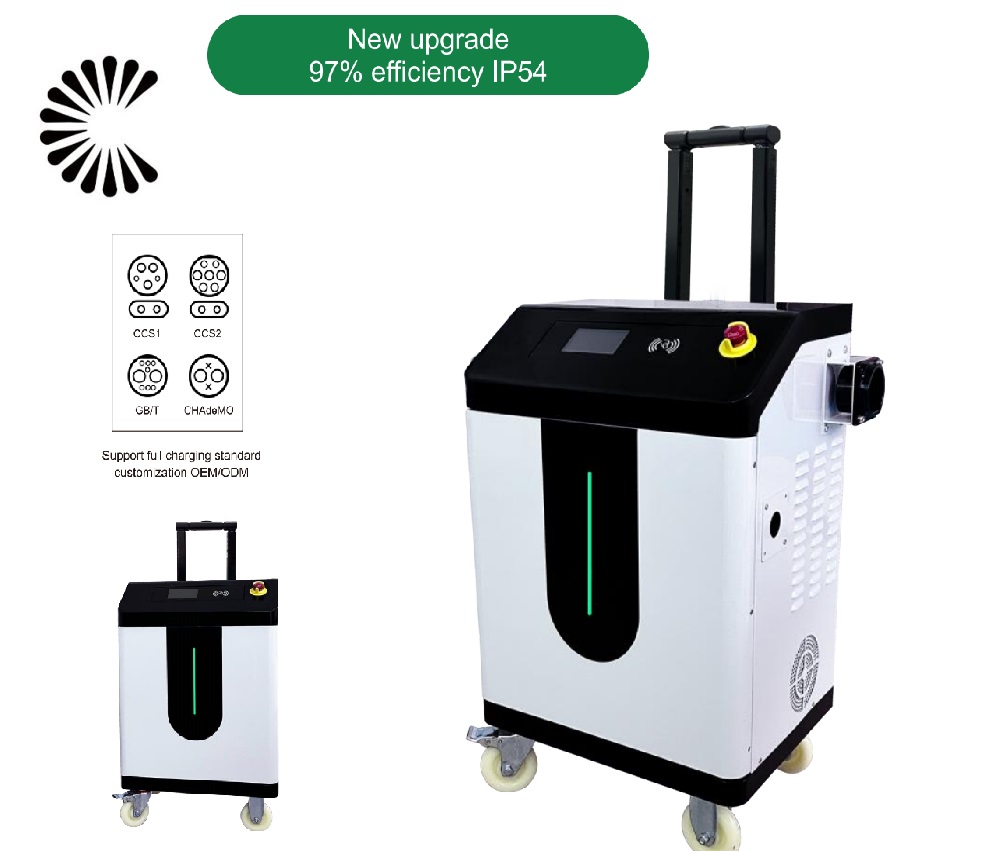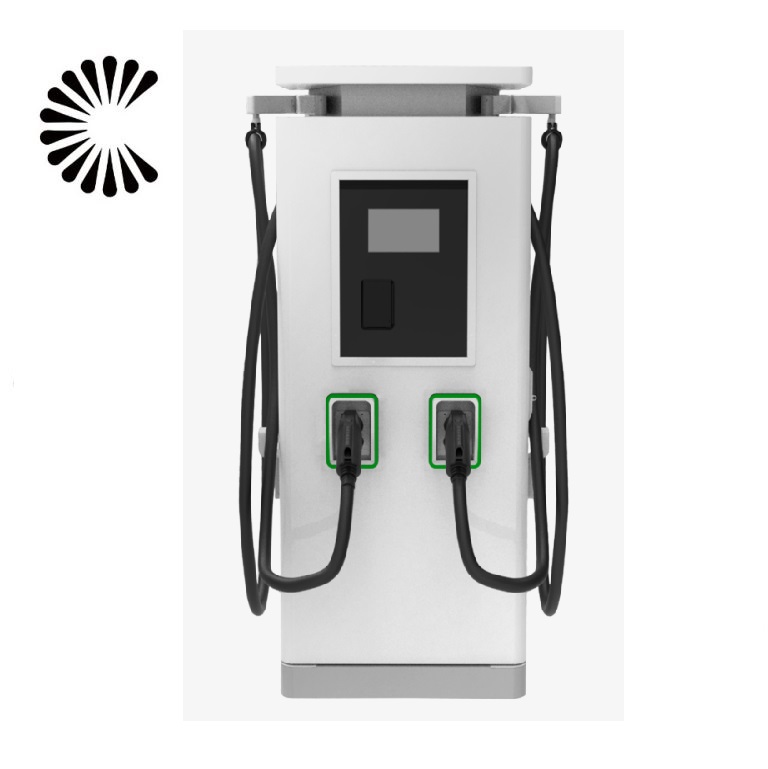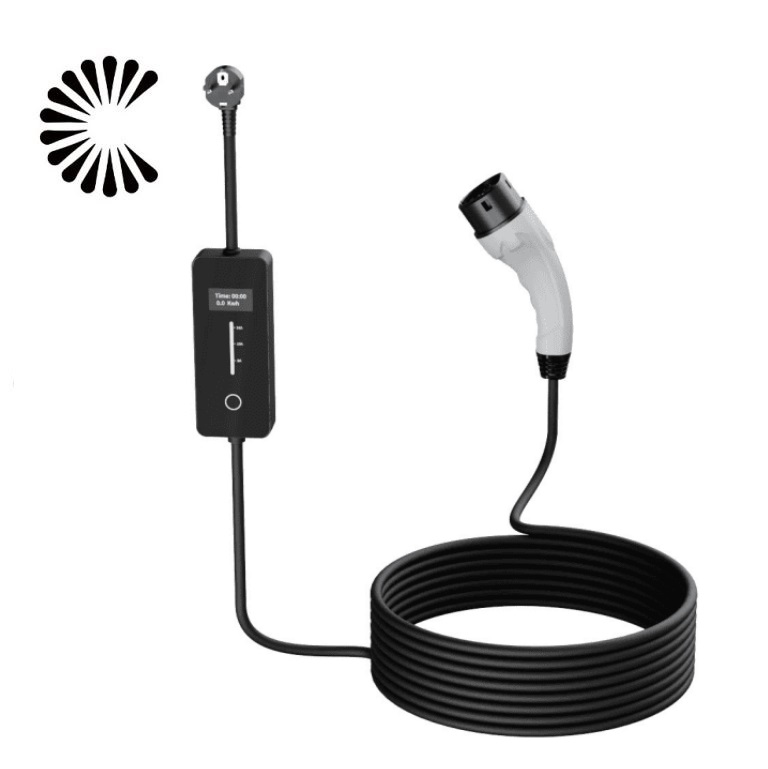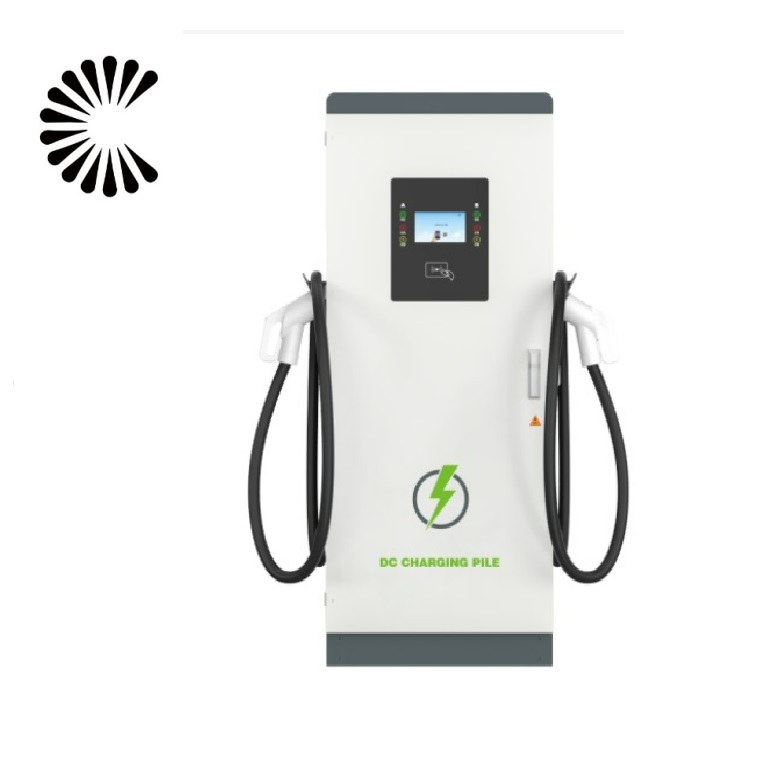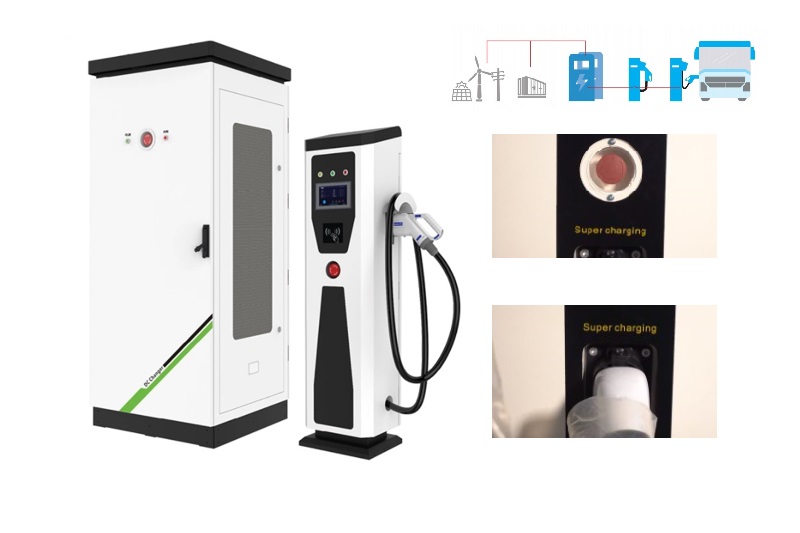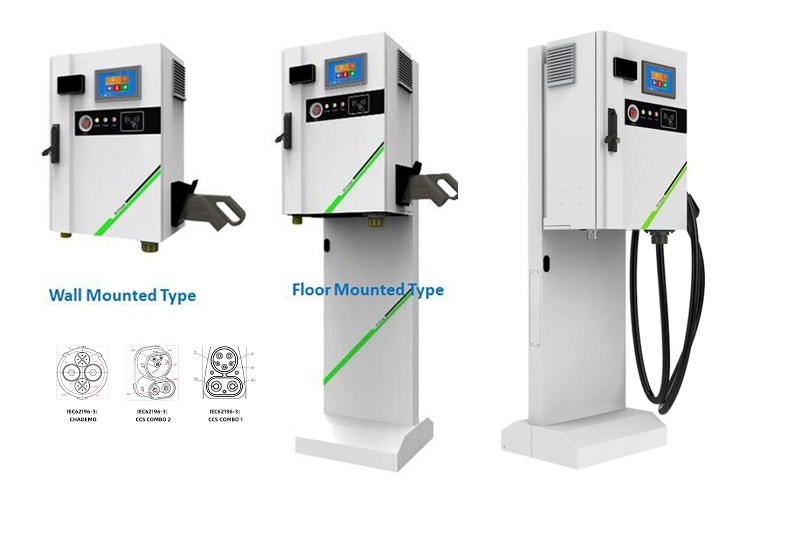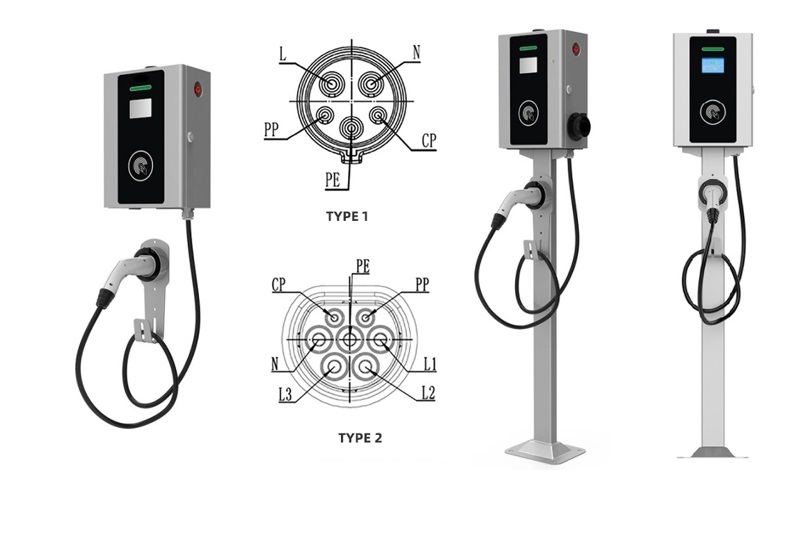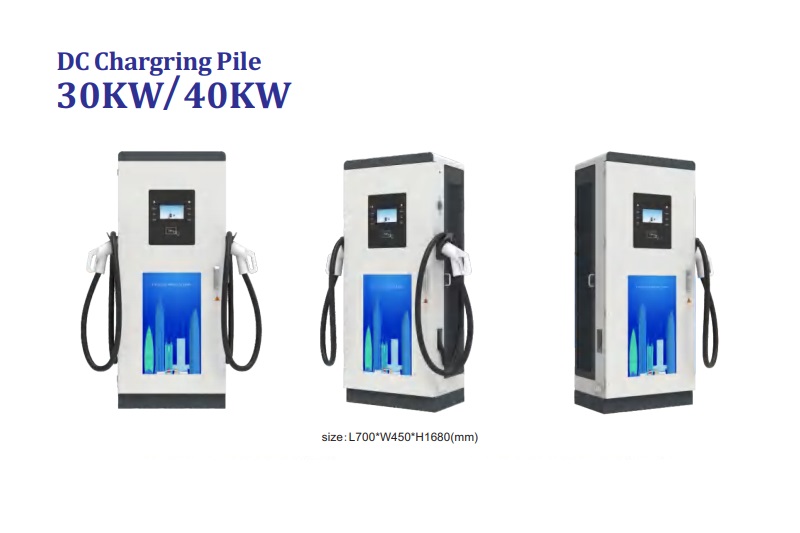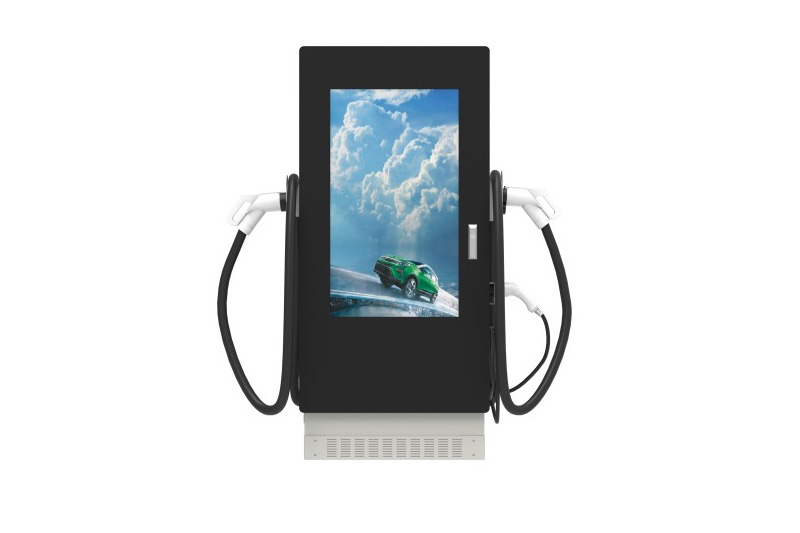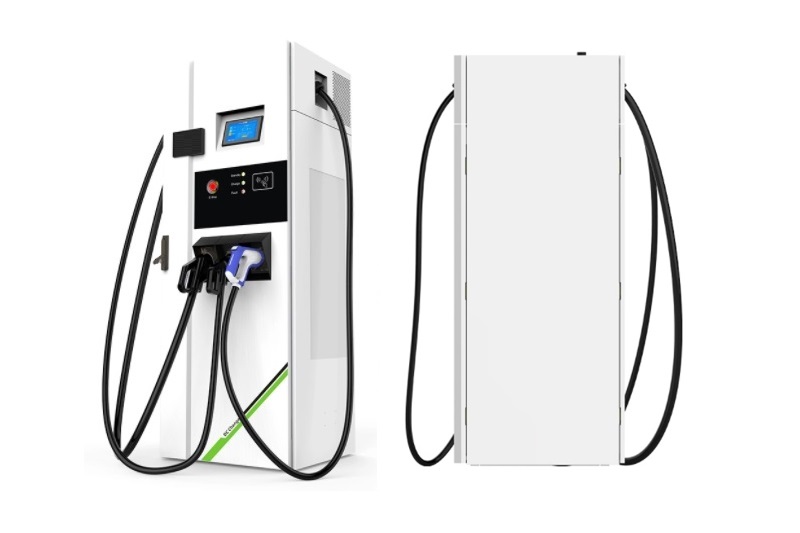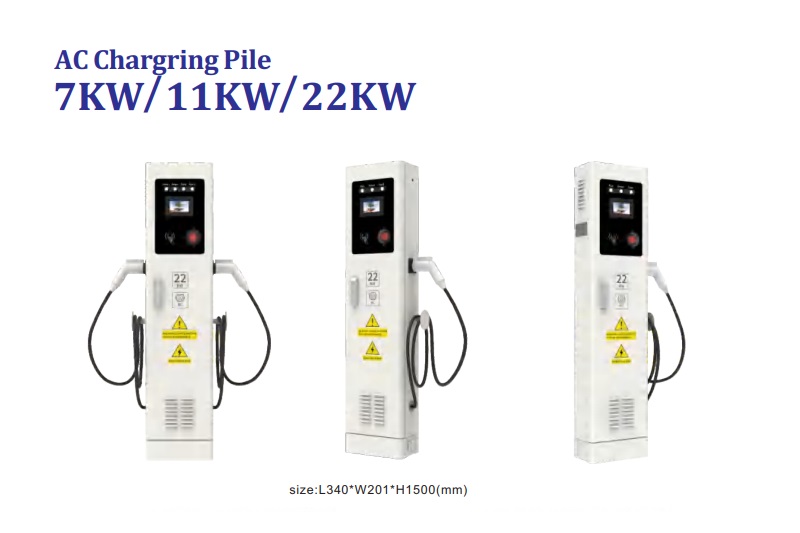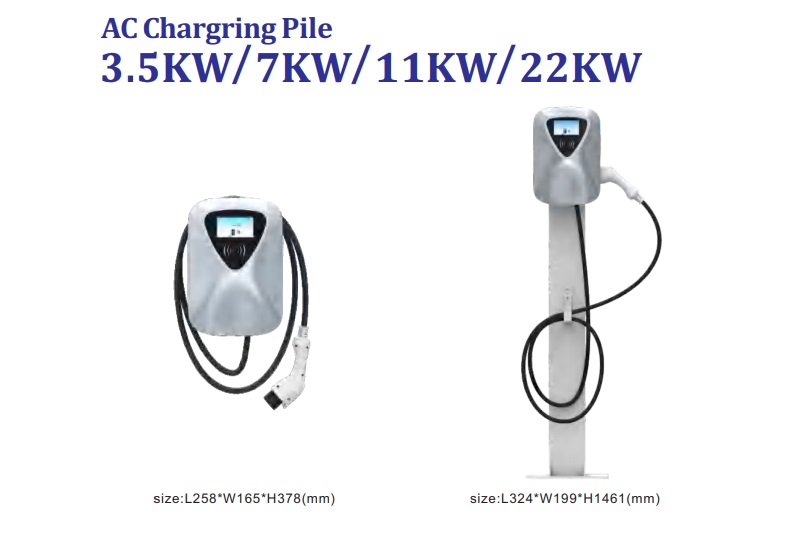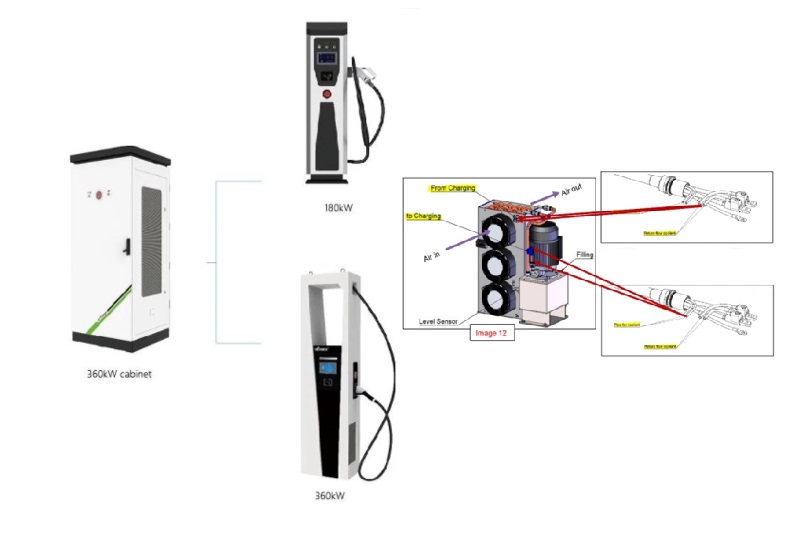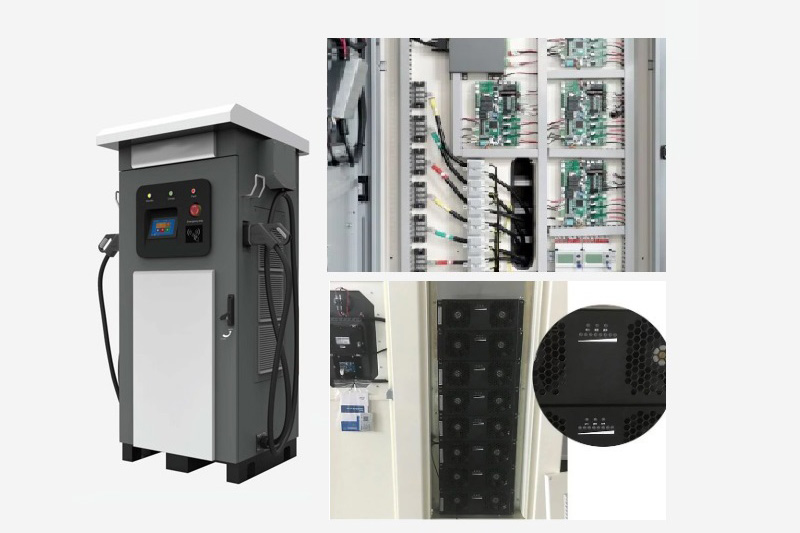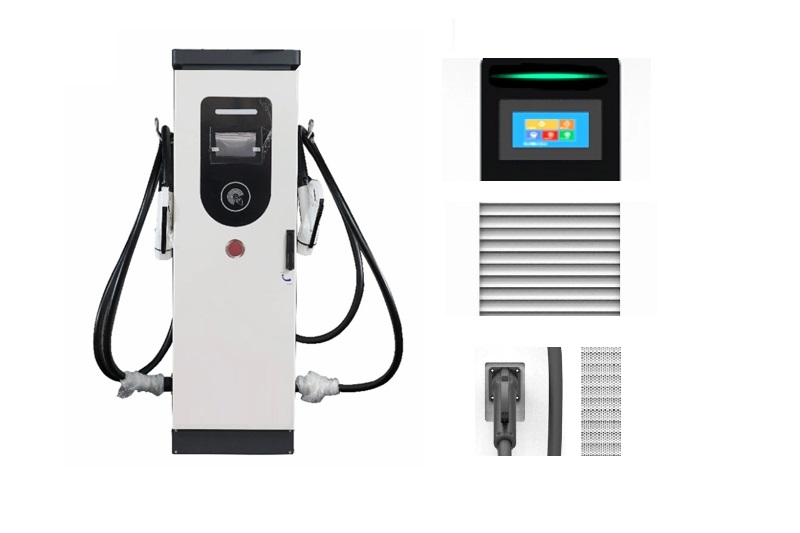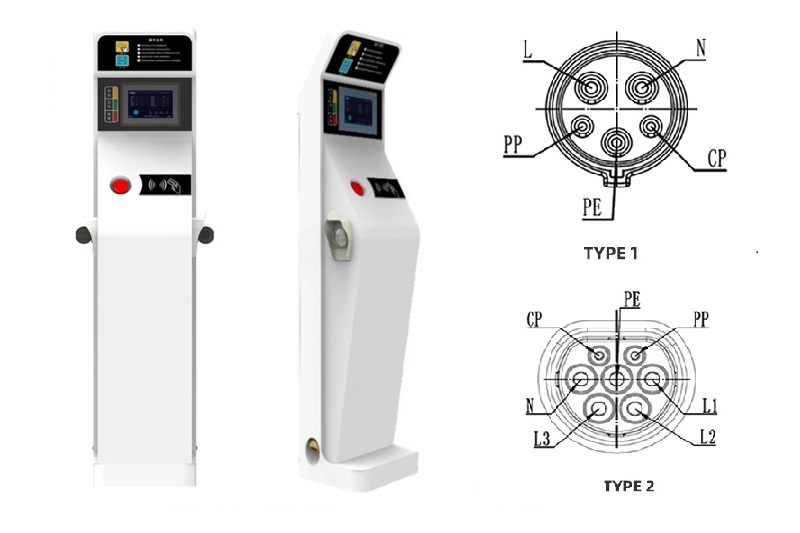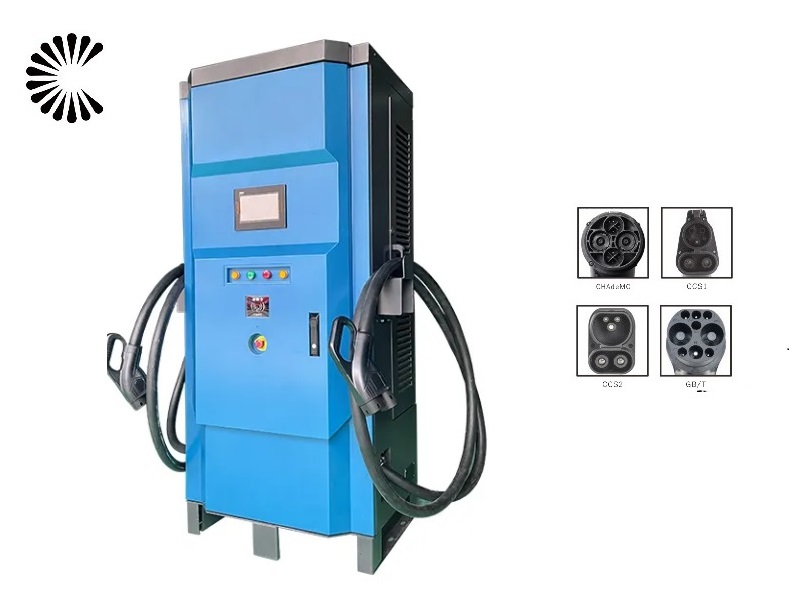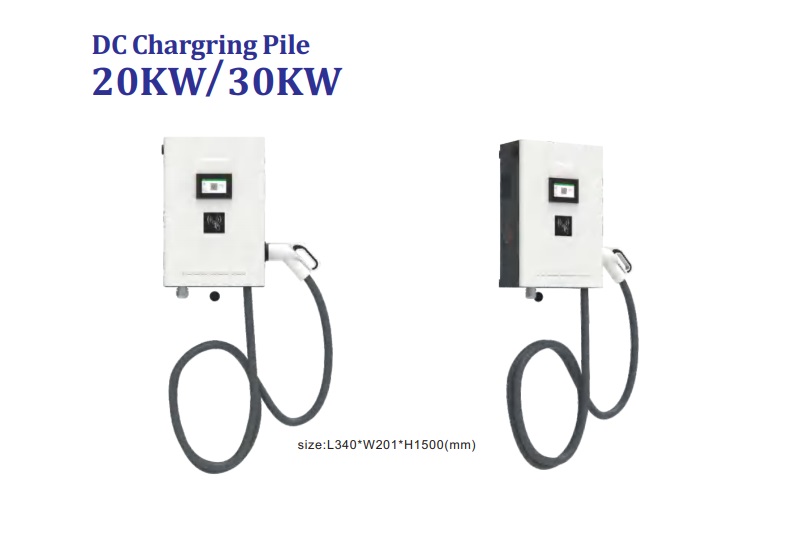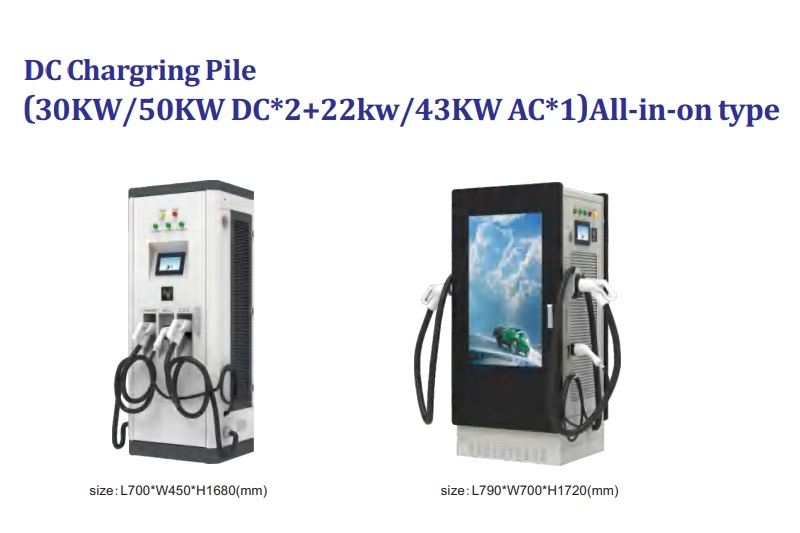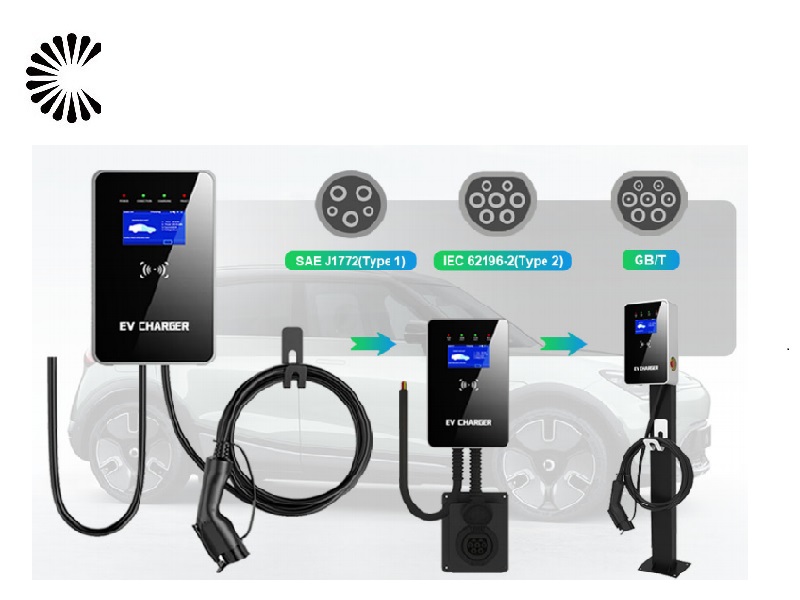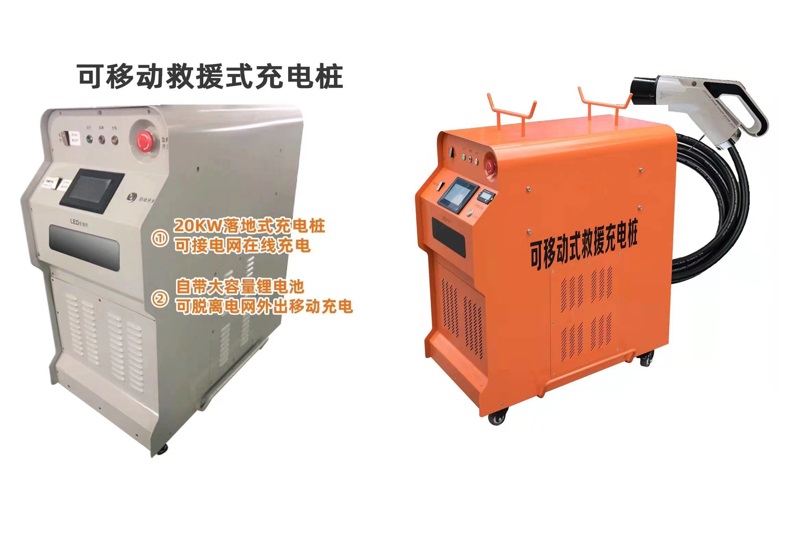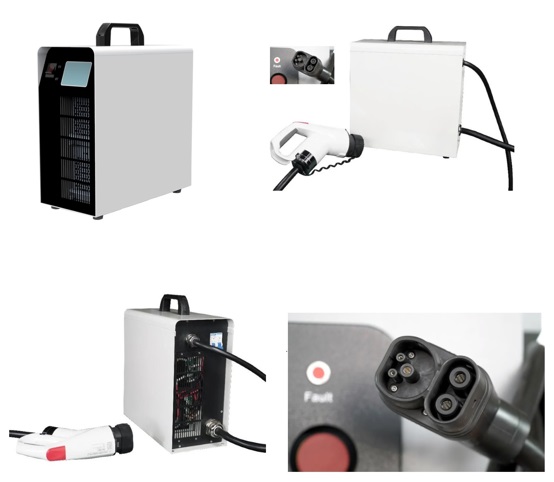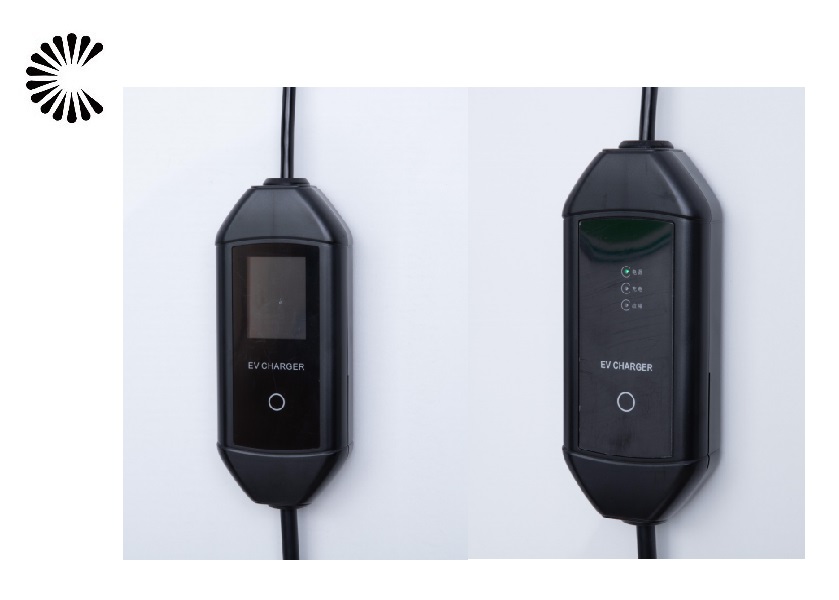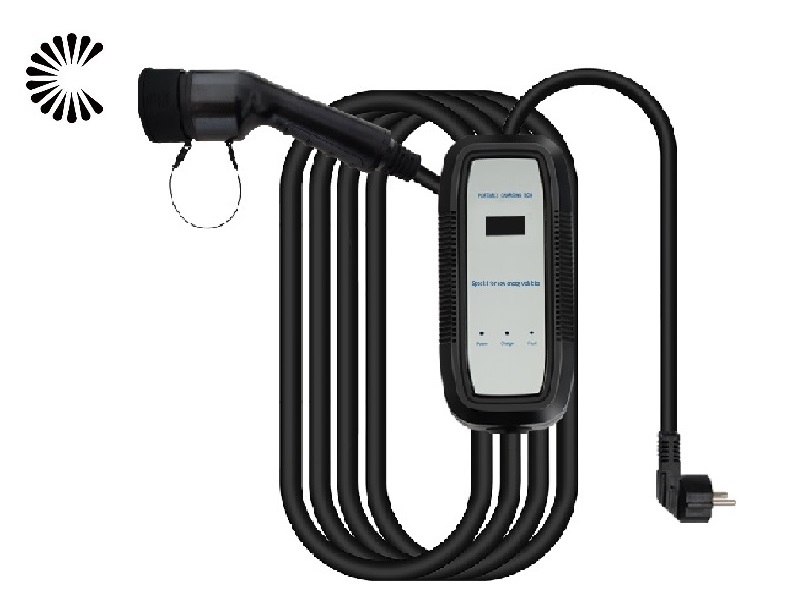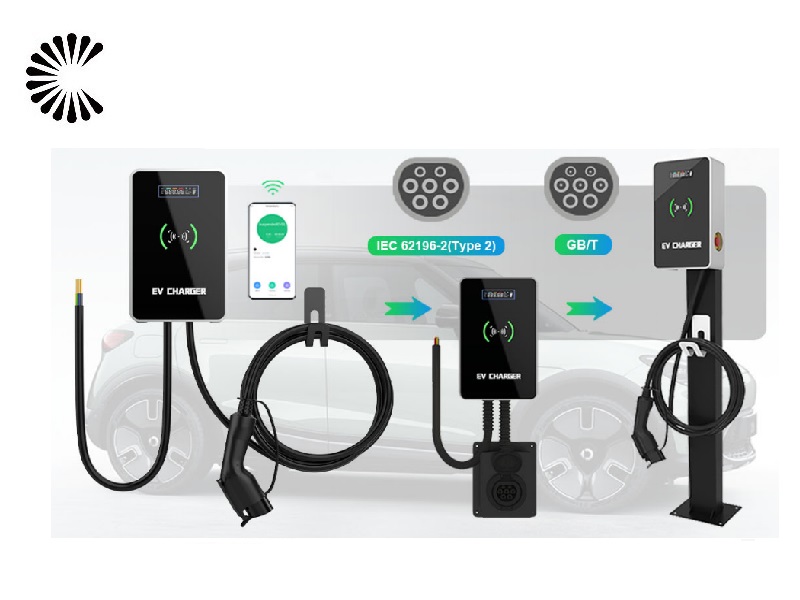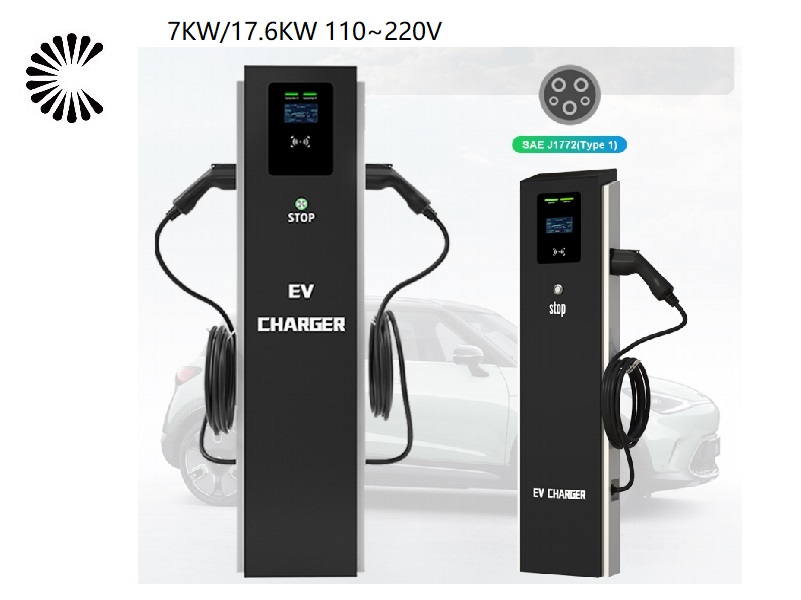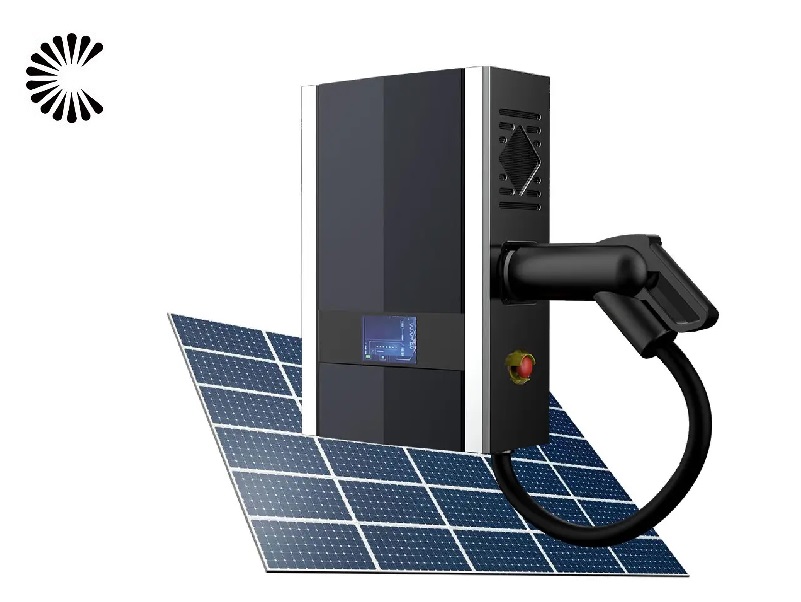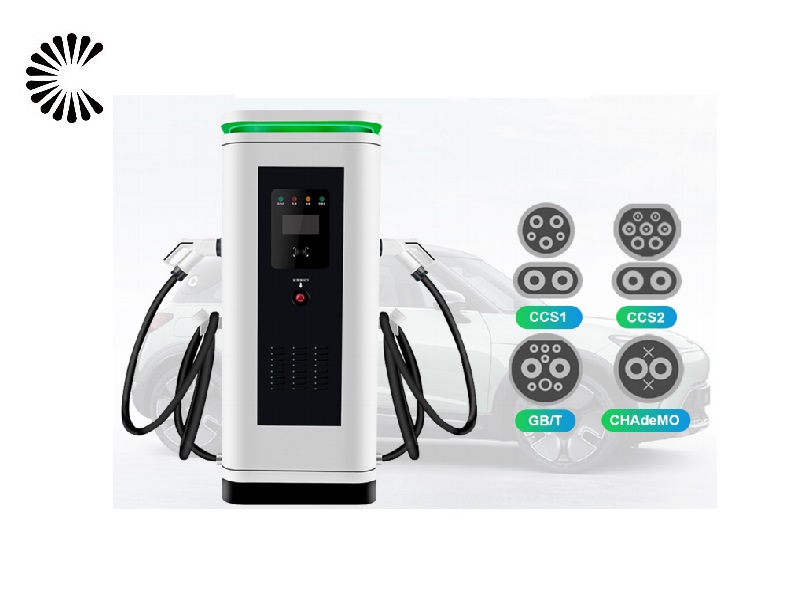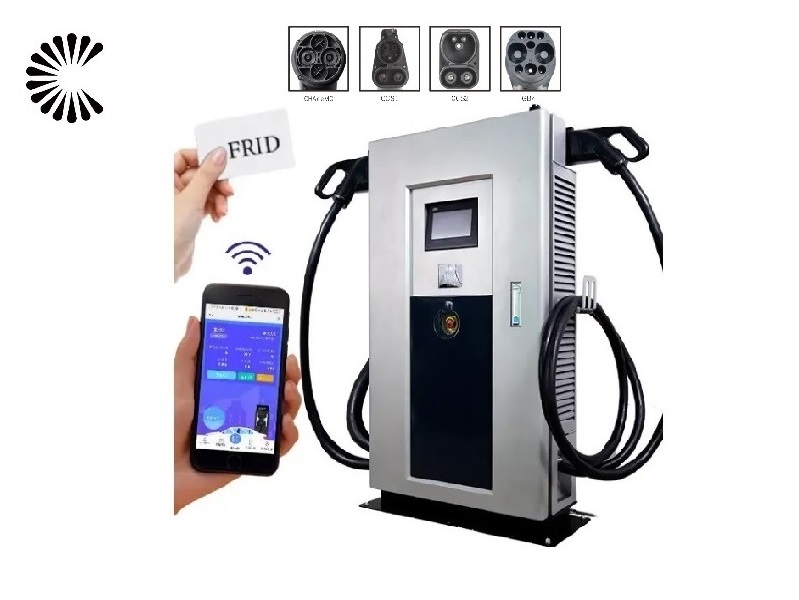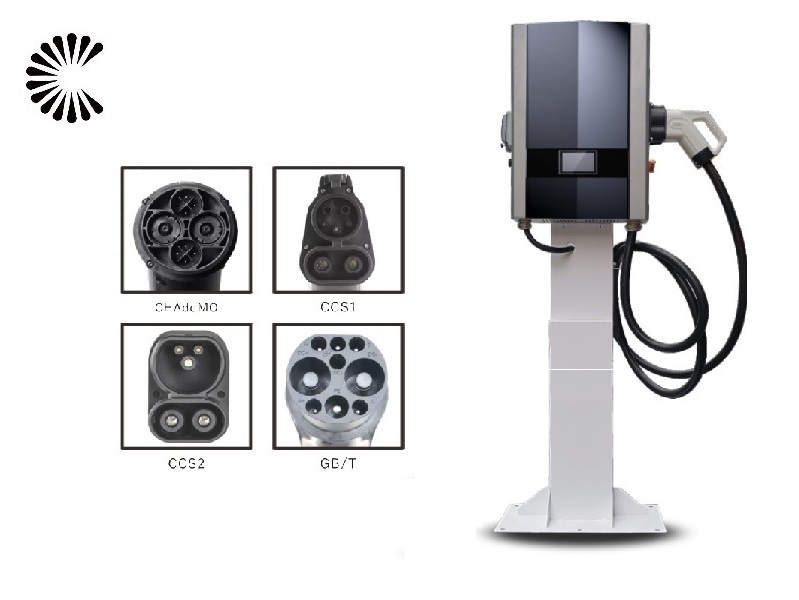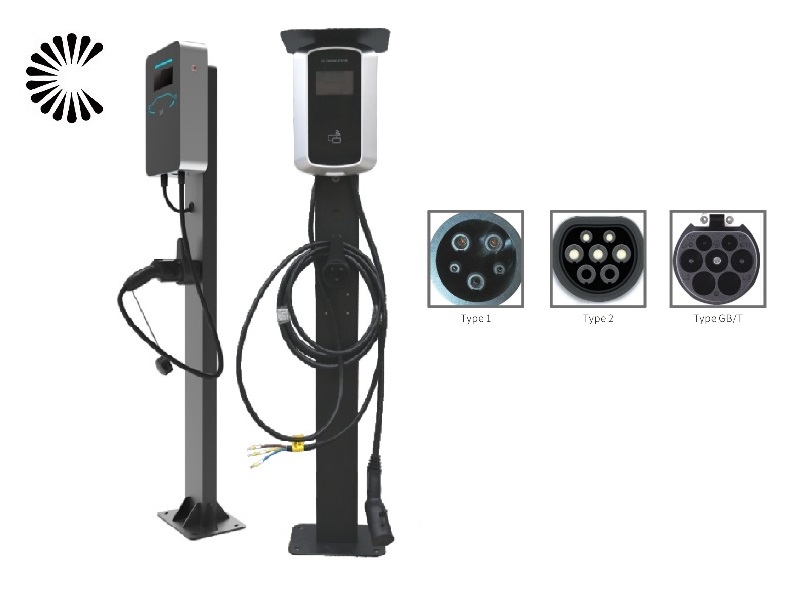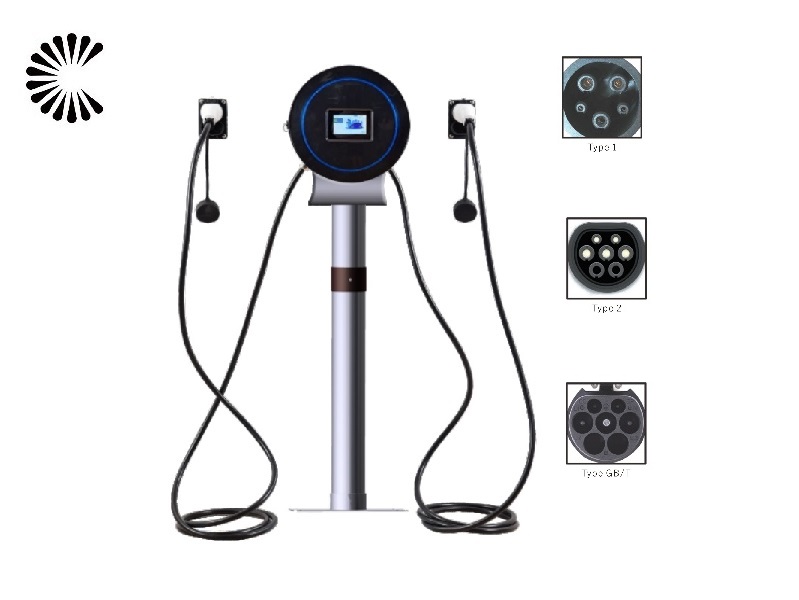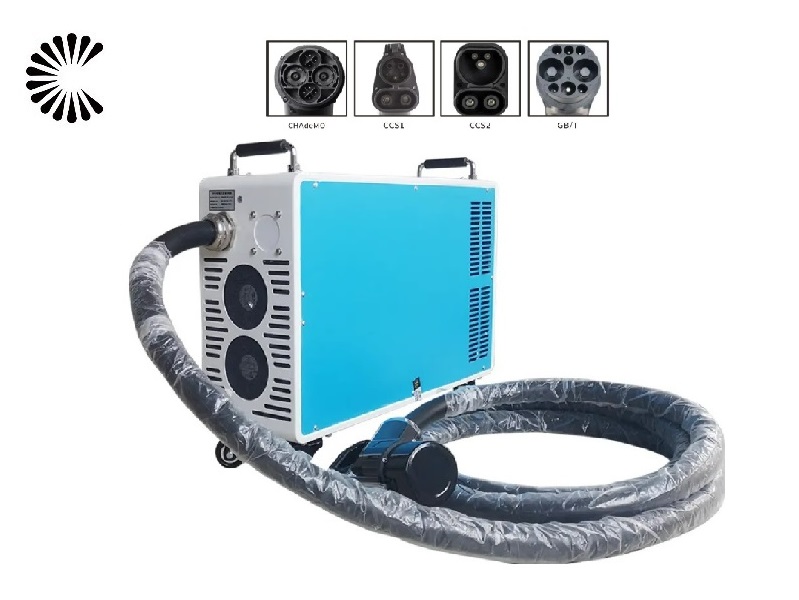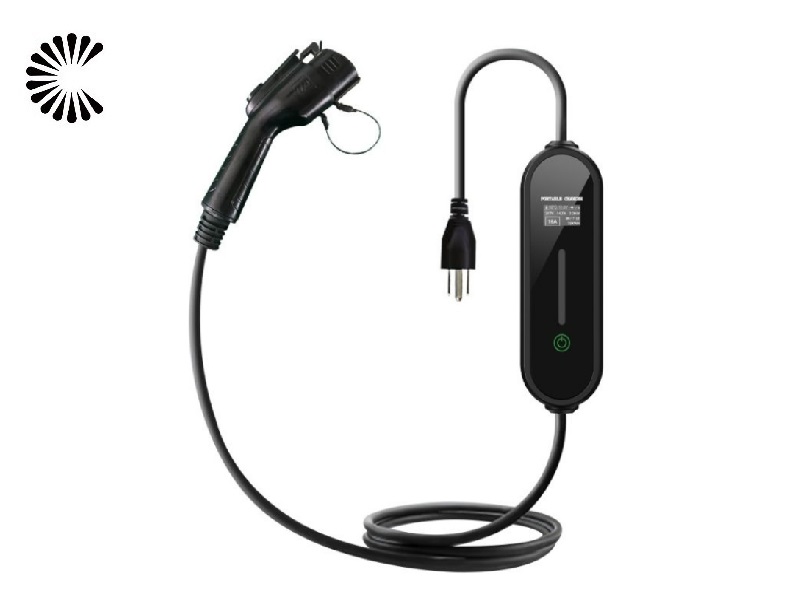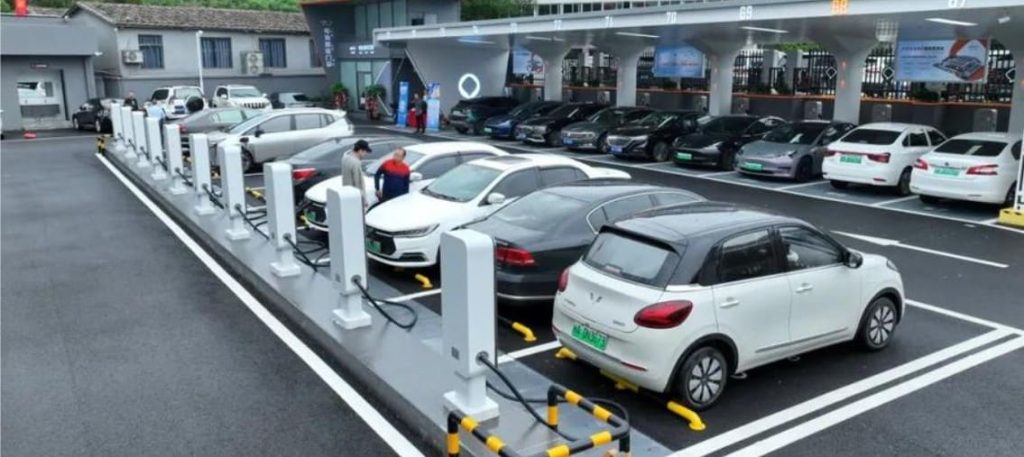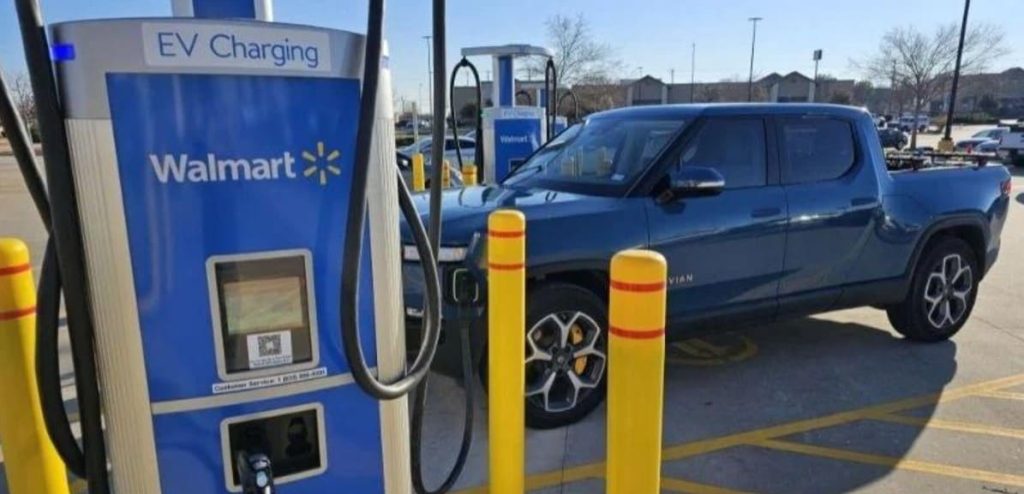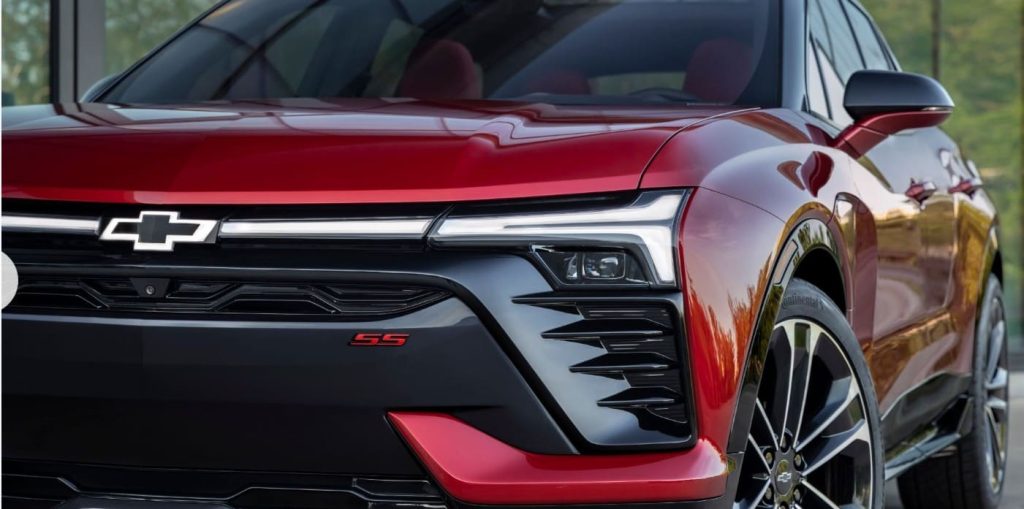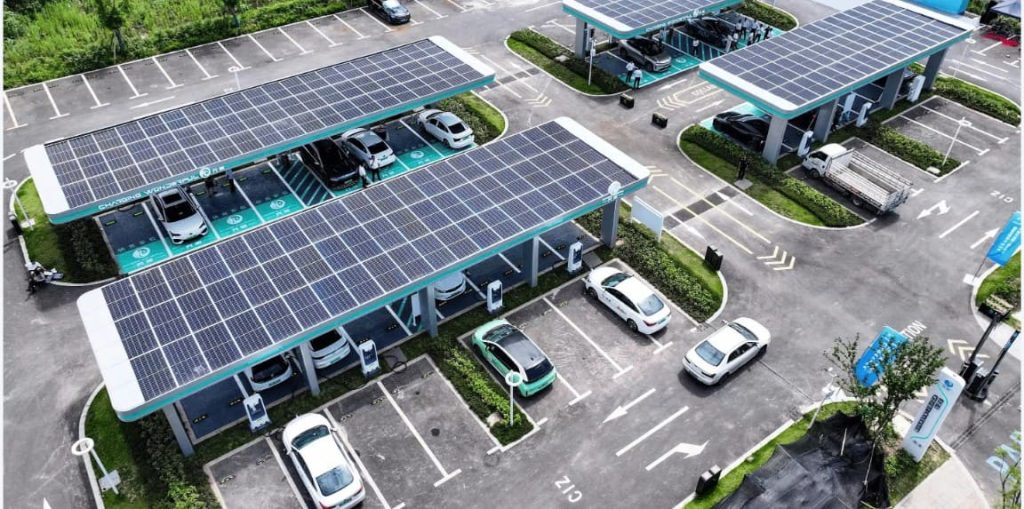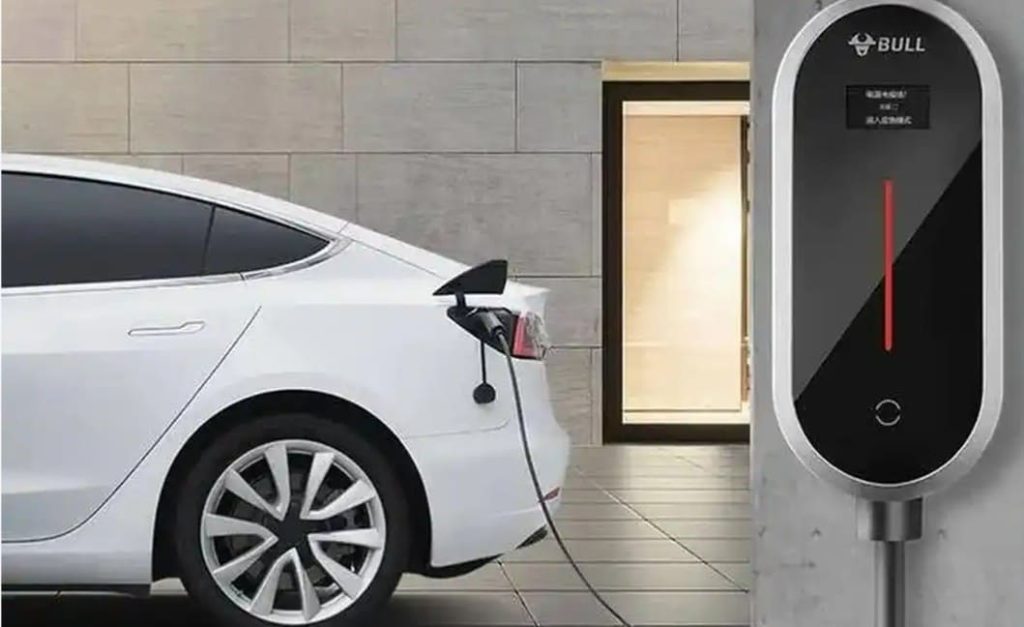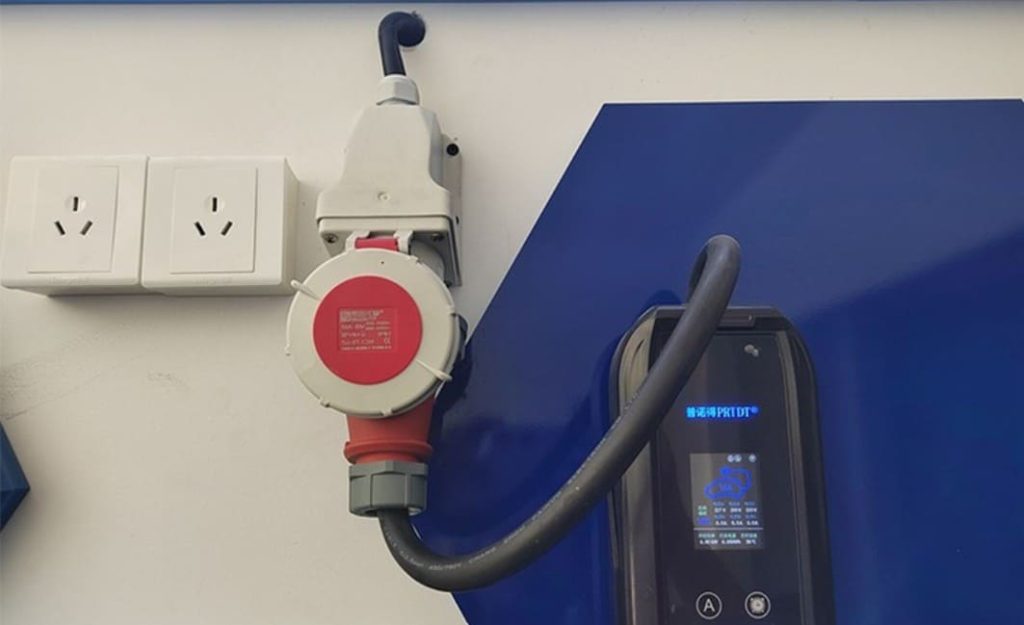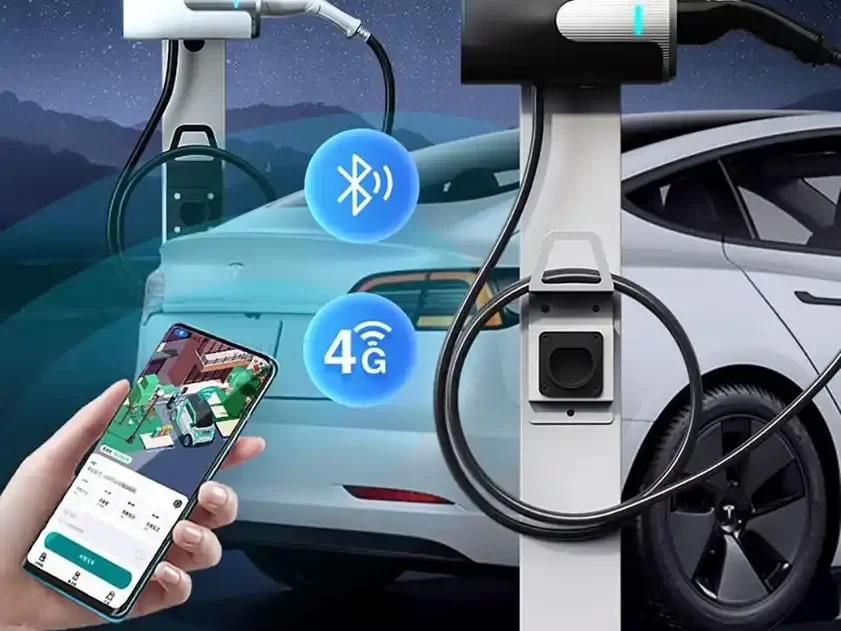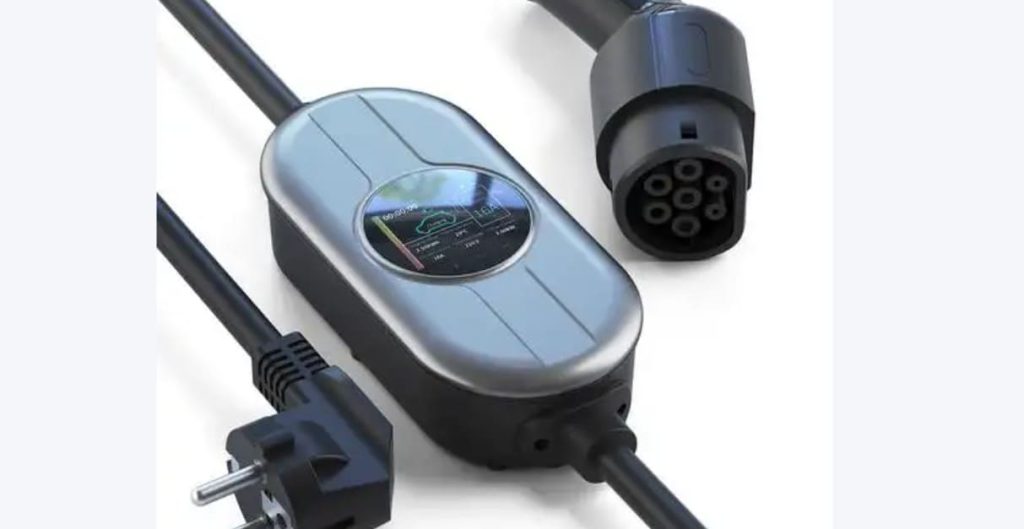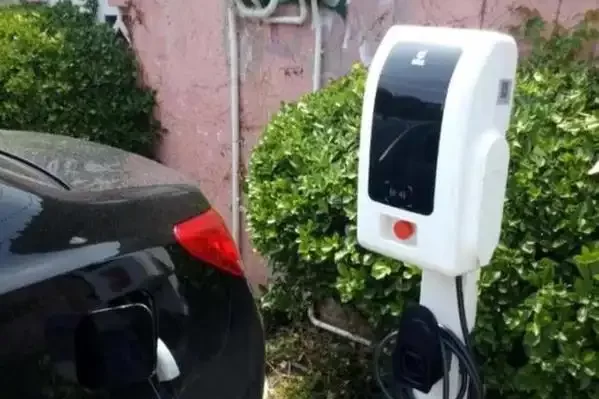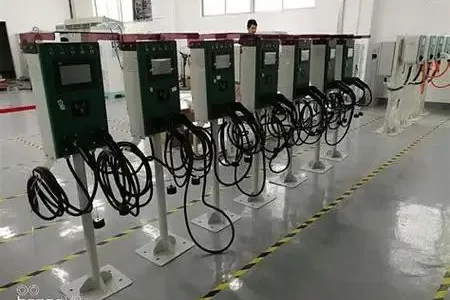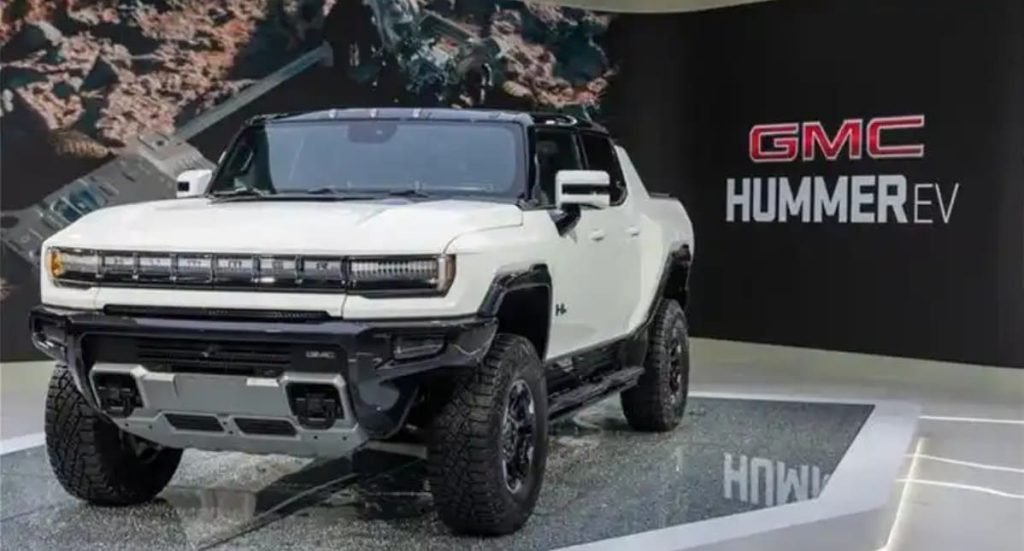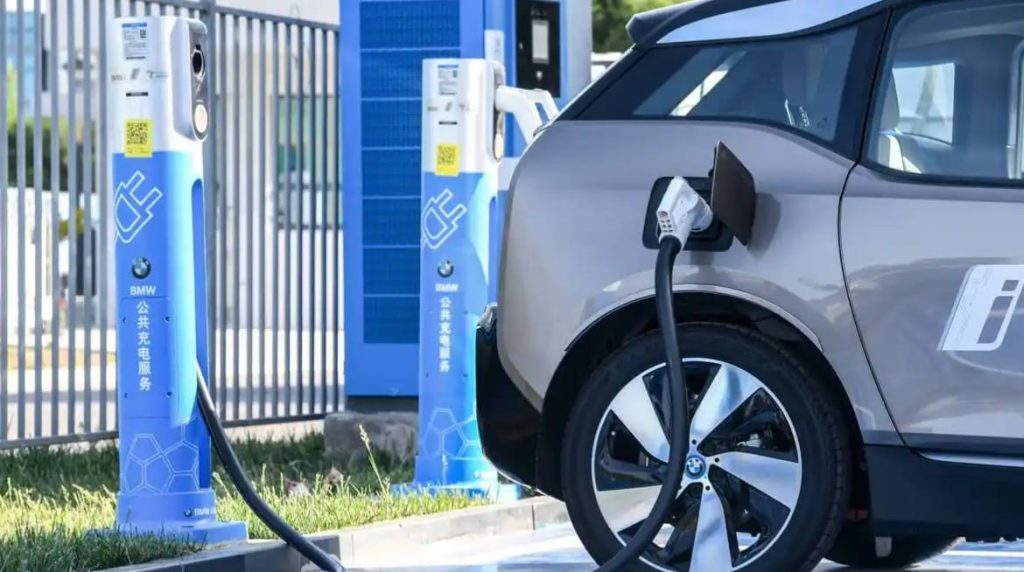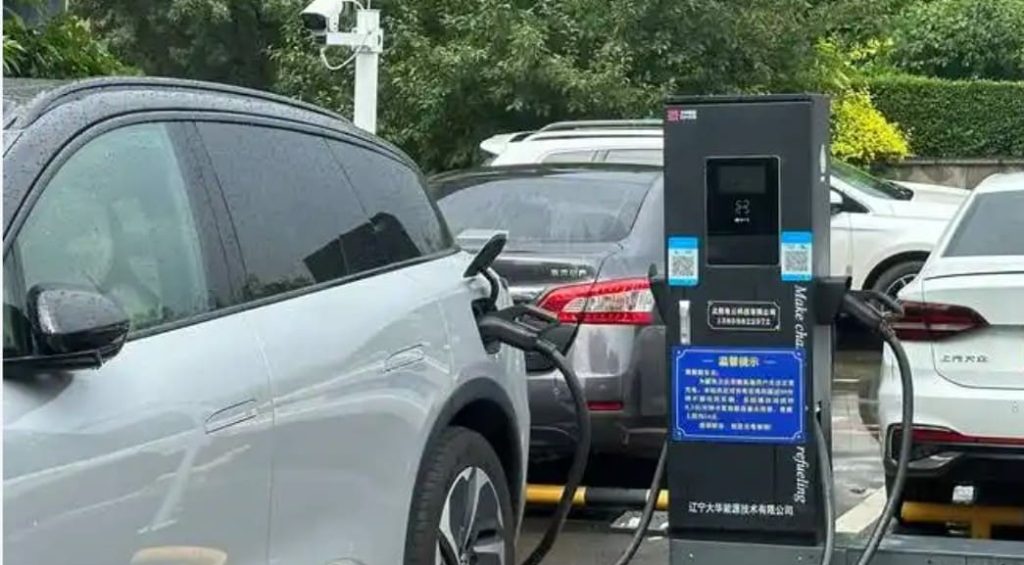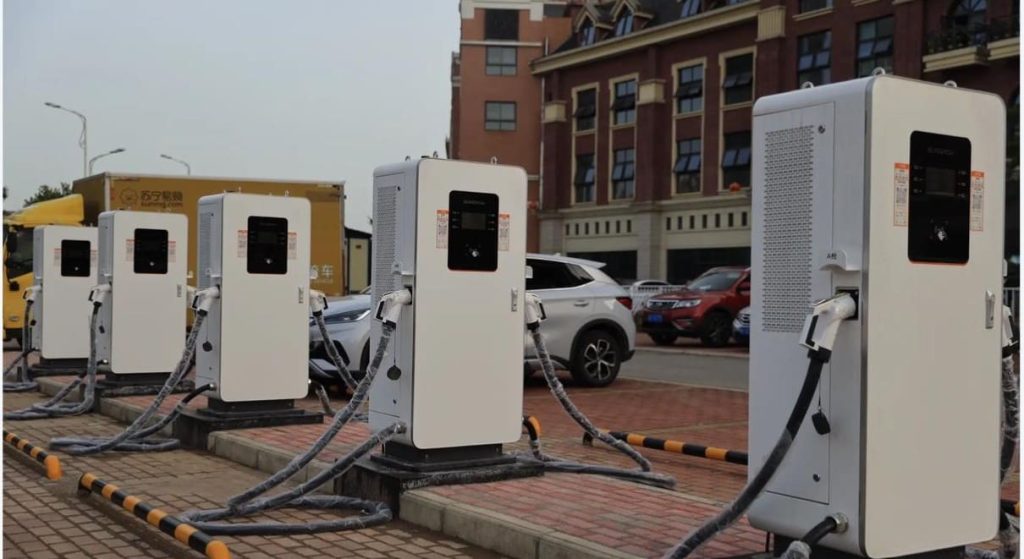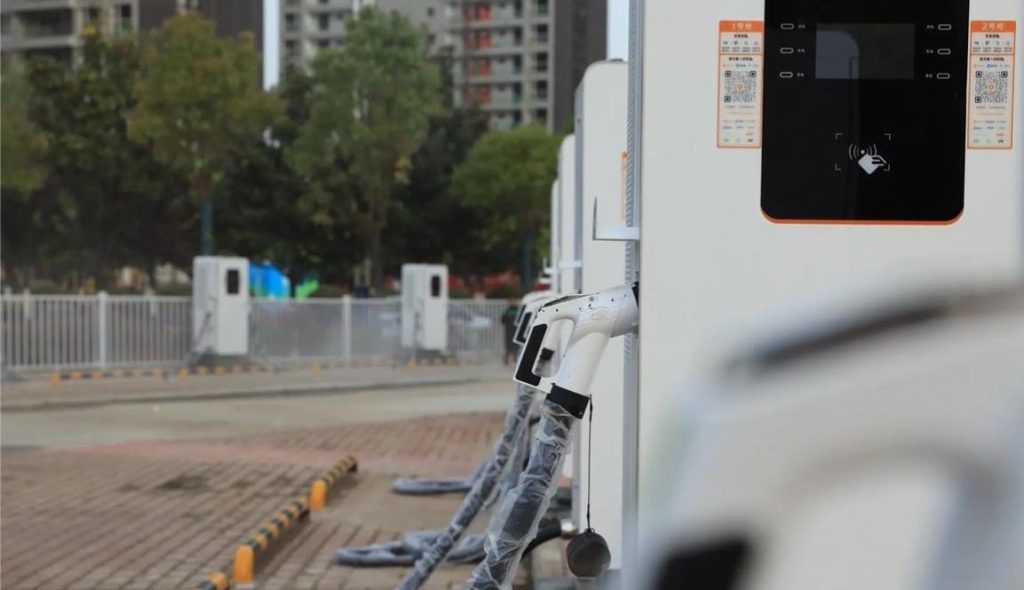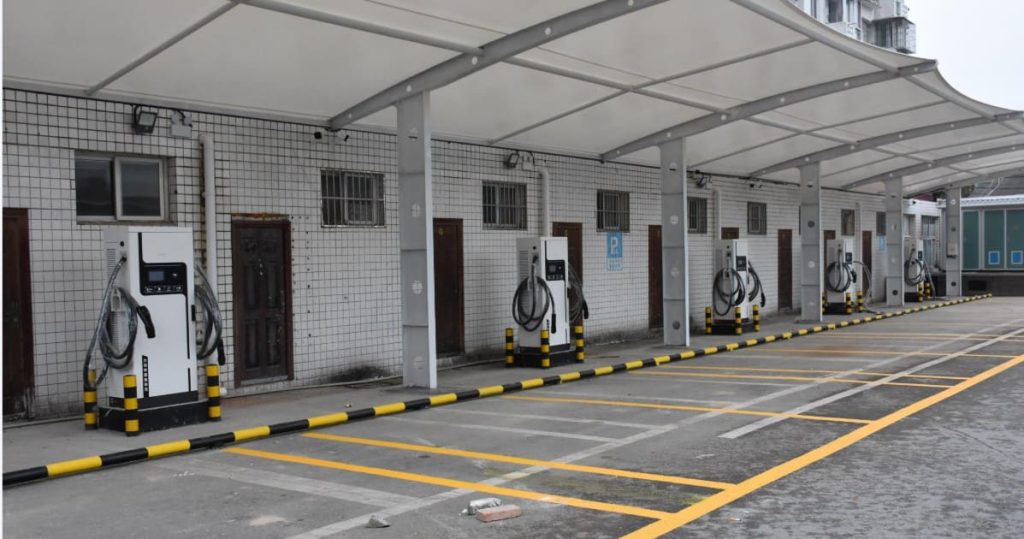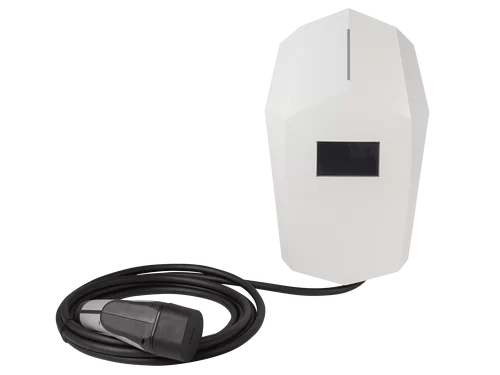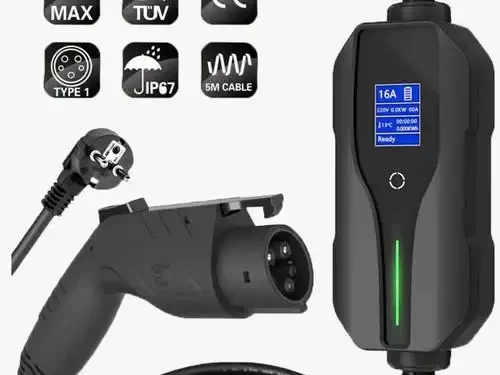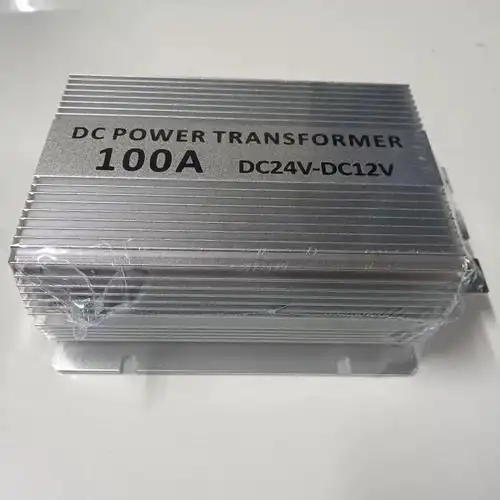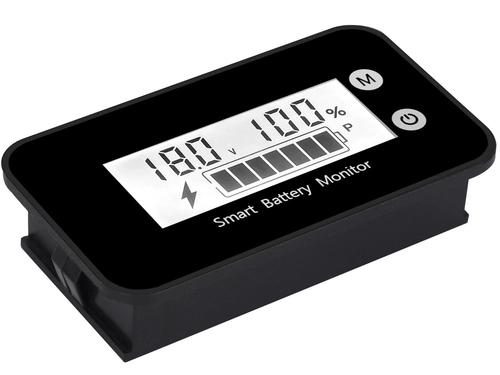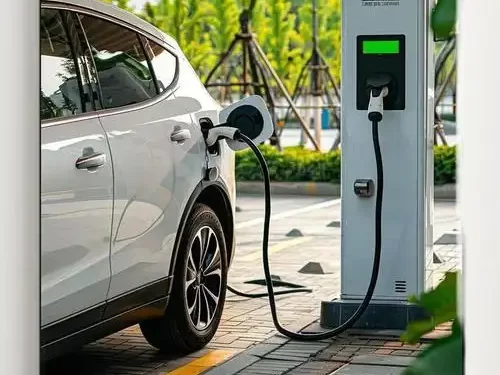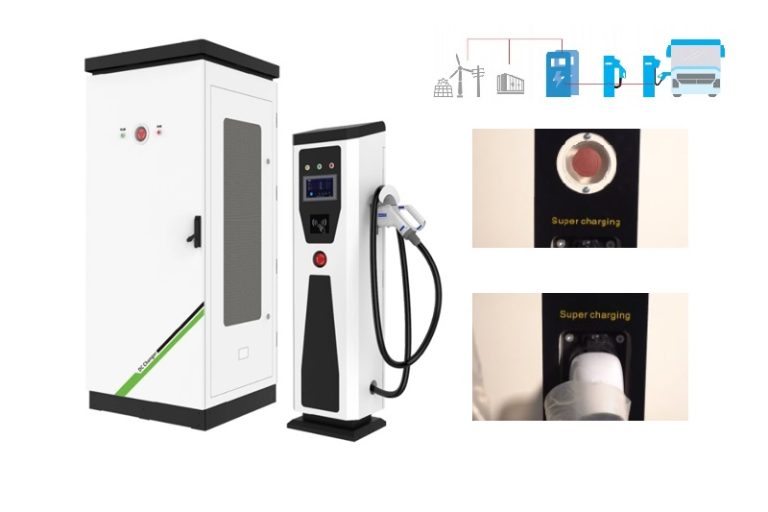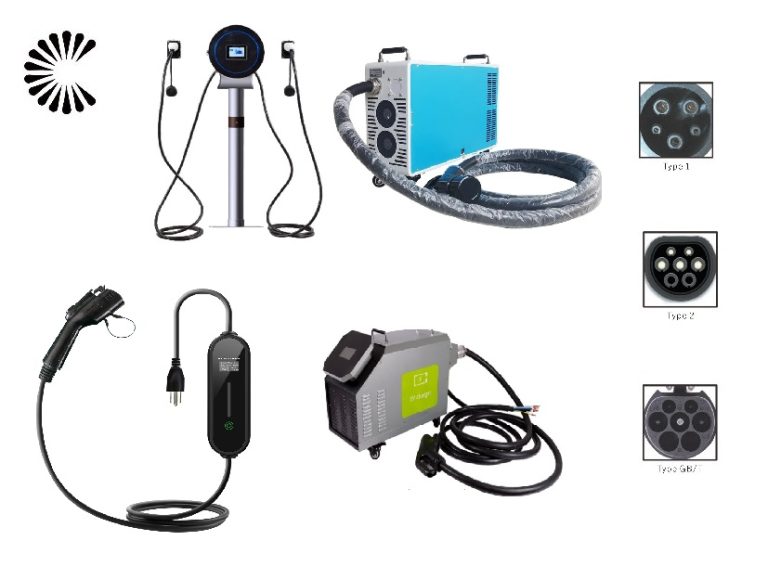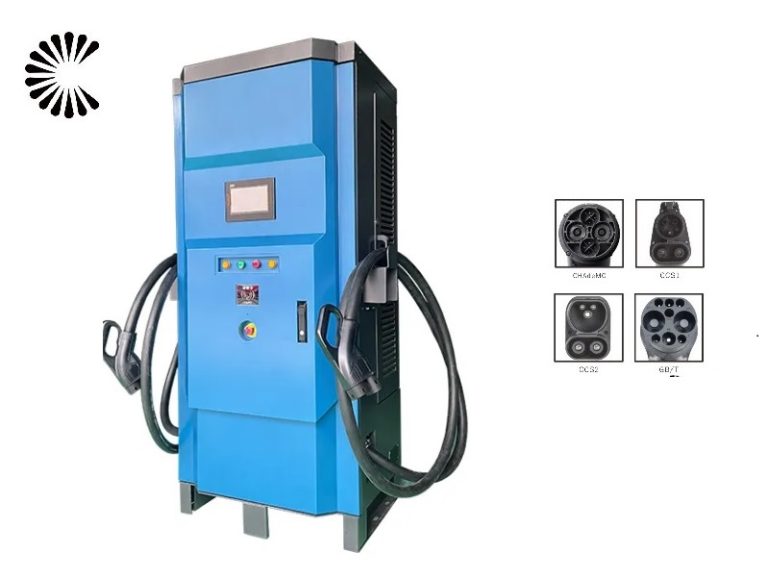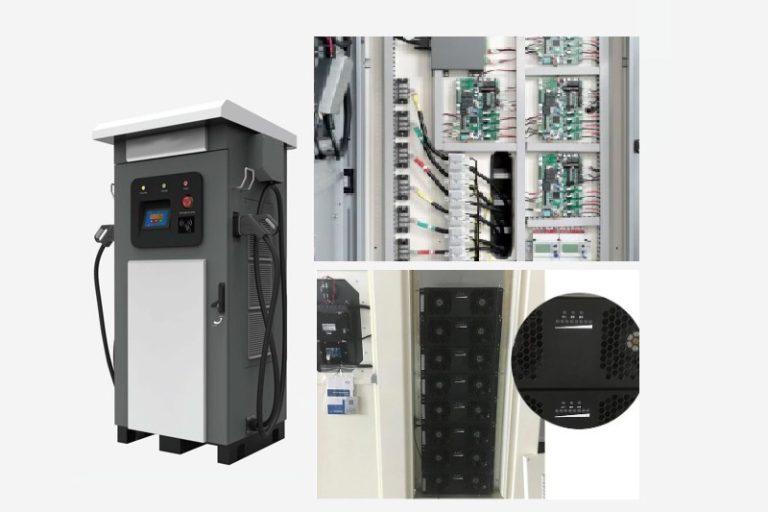7KW EV Charger
Factory Direct Price 30 KW 40KW 60KW GB/T Connector Electric Vehicle EV Charger DC EV Charging Station
Specification of 7KW EV Charger
Appearance structure:
| Model | 7750 | 15750 | 20750 | 30750 | 40750 |
| Output Power | 7KW | 15KW | 20KW | 30KW | 40KW |
| Input Voltage | 90-265V | 260-475V | 260-475V | 260-475V | 260-475V |
| Input Connection | L+N+PE | 3P+N+PE | 3P+N+PE | 3P+N+PE | 3P+N+PE |
| Input Current | 32A | 25A | 32A | 45A | 64A |
| Output Current | 20A | 25A/37A | 33A/60A | 50A/100A | 66A/1230A |
| Weight | 20kg | 25KG | 40KG | 50KG | 60KG |
| Name | Parameters |
|---|---|
| Frequency | 50/60 Hz |
| Power Factor | >0.99@rated voltage |
| Efficiency | 95% |
| TFT-LCD Touch Panel | 4.3 Inch touchable screen |
| Auxiliary Power | 12V(24V Optional) |
| Size(mm) | 635*295*500 |
| Operating Temperature | -2 0℃~+5 0℃ |
| Altitude | 2000M |
| IP Level | IP44 |
| Anti-collision Class | more than IK8 |
| Input Cable Length | 5M(Customization Acceptable) |
| Gun Cable Length | 3M(Customization Acceptable) |
| Applicable Standard | GBT20234/EN62196 /EN61851-1, JEVSG105/CHADEMO |
| Communication Protocol | GBT27930/CHADEMO 2.0/ DIN70121, OCPP1.6(Json)/ ISO 15118 |
Introduction of 7KW EV Charger
An Electric Vehicle (EV) charger designed to power up electric cars and plug-in hybrids, the 7KW EV Charger is a Level 2 charging station, faster than standard household outlets. The “7kW” indicates its charging power, which reaches 7 kilowatts.
With this charger, you can recharge your EV more efficiently and quickly, making it an ideal choice for both residential and some commercial settings. Its versatility ensures compatibility with most modern electric vehicles, enabling EV owners to charge up their cars faster and conveniently.
Imagine being able to top up your EV’s battery overnight or during extended parking, thanks to the faster charging speed provided by the 7KW EV Charger. It strikes a balance between efficiency and convenience, making it a sought-after charging solution for electric vehicle owners like you.
In summary, the 7kW EV charger offers an effective and convenient way to charge your electric car, providing faster charging times compared to regular wall sockets. Whether at home or in select commercial spaces, this charger is designed to meet your EV charging needs and keep you ready to hit the road with ease.
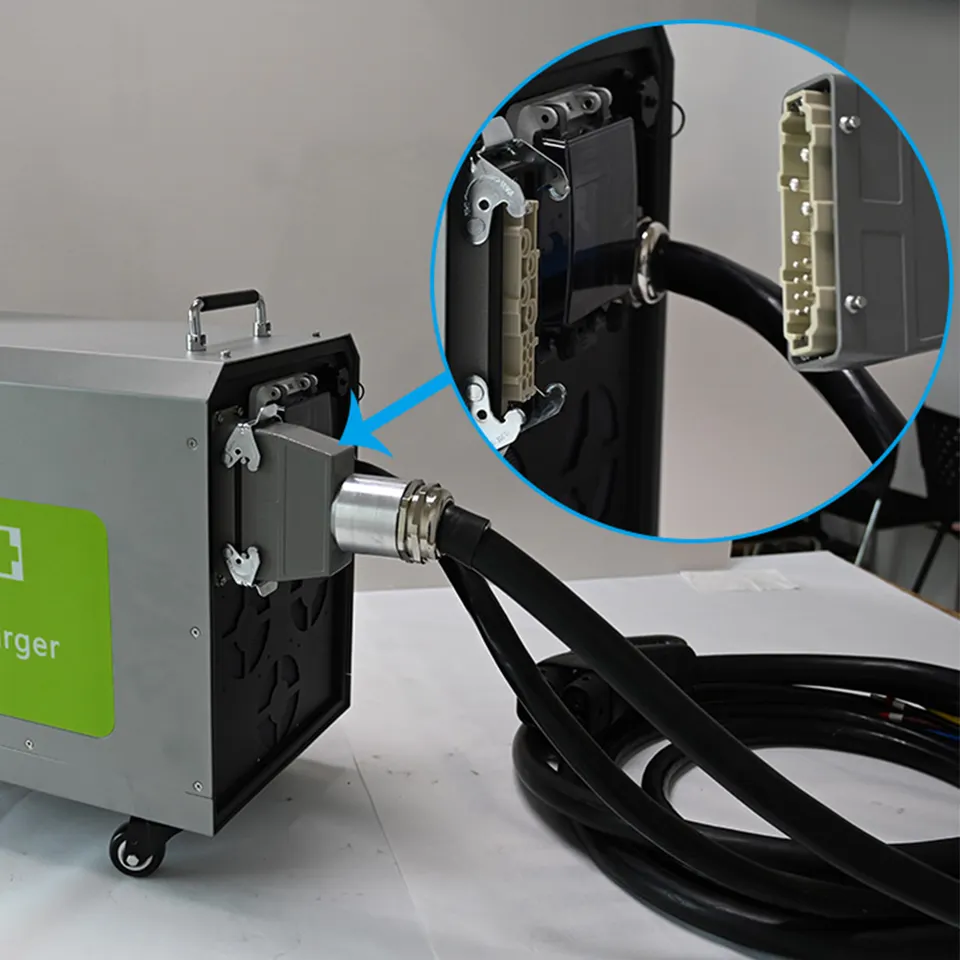
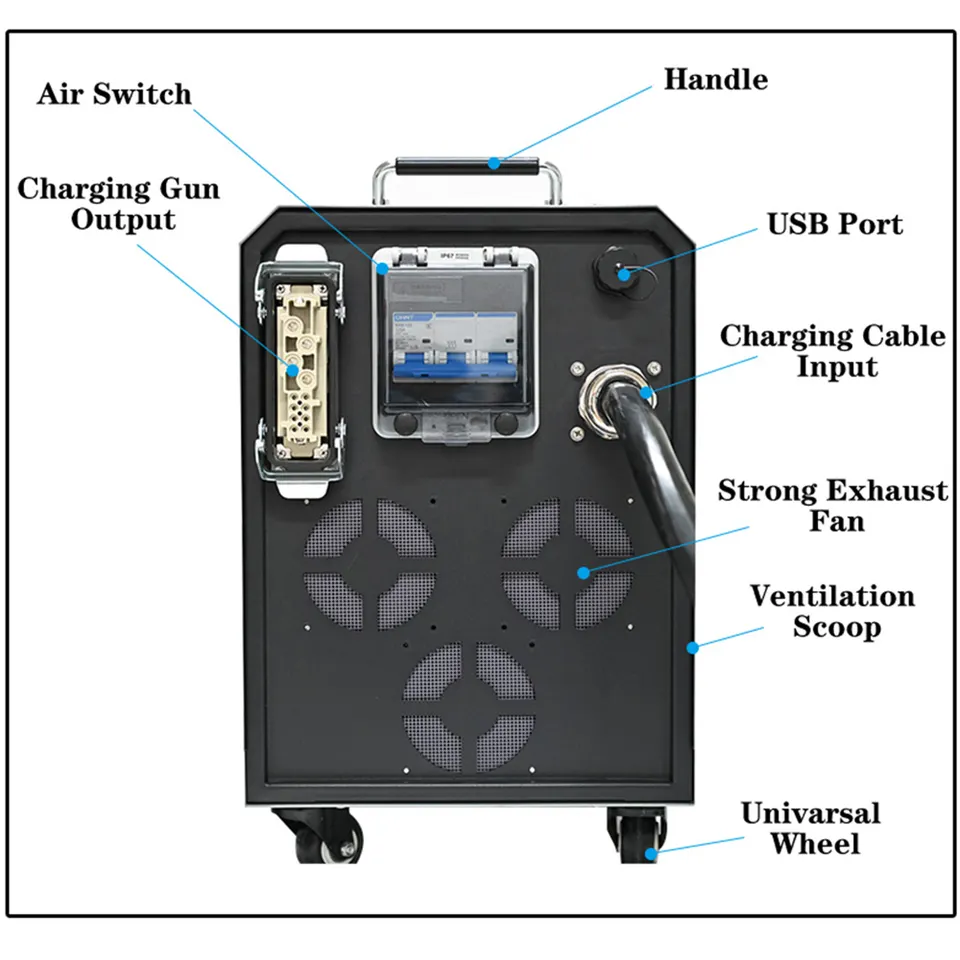
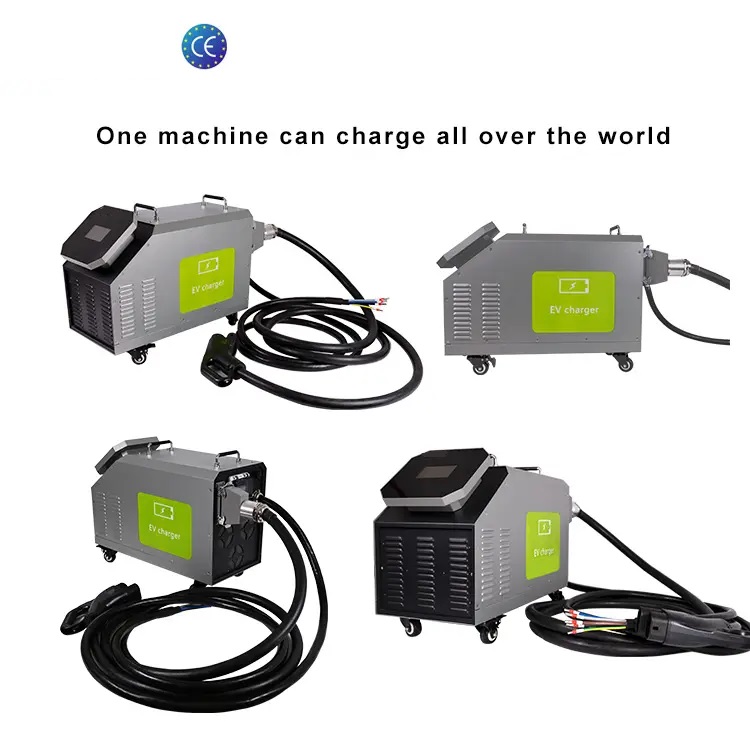


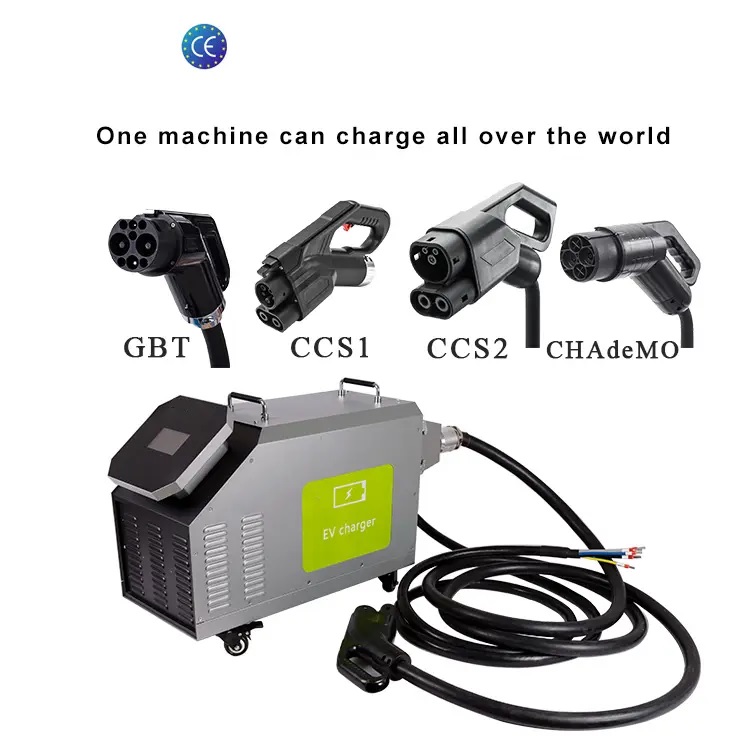
Advantages of 7KW EV Charger
A 7KW EV (Electric Vehicle) charger offers several advantages for electric vehicle owners. Here are some key benefits:
| Business Type: | Manufacturer/Factory | Main Products: | EV Charger |
| Number of Employees: | 100 | Year of Establishment: | 2014.05 |
| Production Capacity | 5000Set/Year | After-sales Service: | Technical Support; on-line teach lessons |
| R&D Capacity: | ODM, OEM | Annual Output Value: | US$5 Million – US$10 Million |
| No. of R&D Staff: | 5 | No. of Production Lines: | 6 |
ChargersGO is a professional manufacturer for EV Charger. Our main product including slow charger, fast charger, DC EV Charger, AC EV Charger, commercial EV Charger, charger for home, EV charger level 1, level 2 and level 3 etc. All products in accordance with the China GMP design requirements. And also we have other certifications.
Business Philosophy
“Quality is the main policy of sales” and “integrity is the principle of success” are the business philosophy of our people. We carry out one-year warranty, lifelong maintenance service, with technical consultation and other services, and long-term supply of equipment. Welcome new and old customers to negotiate cooperation!
Small Machine Packing:
Retail Small EV Charger shipped with express.
Wsholesale Small EV Charger packed with export fumigation-free wooden cases, goes with bulk shipment or in container.
When packing small machines for sea shipment, it is important to take measures to ensure that the machines are protected from damage during transit. Here are some general steps that a manufacturer may follow when packing small machines for sea shipment:
- Clean and dry the charger: Before packing, the charger should be thoroughly cleaned and dried to prevent any moisture or debris from causing damage during transit.
- Disassemble the machine: If possible, the charger should be disassembled into its component parts to reduce its overall size and make it easier to pack.
- Wrap the charger in protective material: The charger should be wrapped in a layer of protective material, such as bubble wrap or foam, to protect it from scratches and impact during transit.
- Place the charger in a sturdy box: The wrapped charger should then be placed in a sturdy box that is appropriate for the size and weight of the machine. The box should be made of durable material, such as corrugated cardboard or plywood, and should be able to withstand the rigors of sea transit.
- Add packing material: The box should be filled with packing material, such as packing peanuts or air pillows, to provide cushioning and prevent the machine from shifting during transit.
- Seal the box: The box should be securely sealed with high-quality packing tape to prevent it from opening during transit.
- Label the box: The box should be clearly labeled with the charger’s name, weight, and any other relevant information, as well as the destination address and contact information.
Overall, the goal is to pack the small chargers in a way that will protect it from damage during transit and ensure that it arrives at its destination in good condition. It is important to follow proper packing procedures and use high-quality packing materials to minimize the risk of damage during sea shipment.
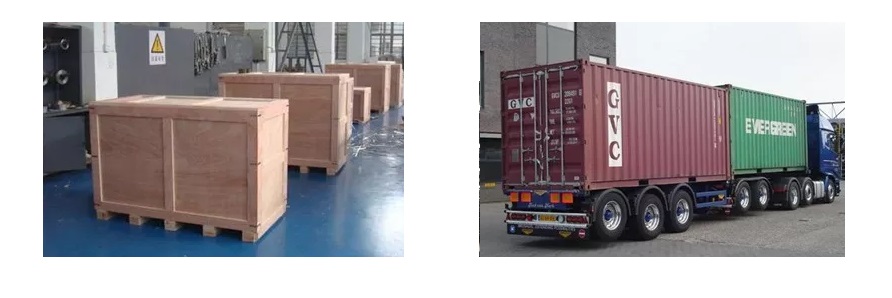
Large Machine Packing:
Packing a large machine for sea shipment can be a complex and challenging task. However, with careful planning and attention to detail, it is possible to pack a large machine for sea shipment in a way that will ensure that it arrives at its destination in good condition. Here are some general steps that a manufacturer may follow when packing up a large machine for sea shipment:
- Clean and prepare the machine: Before packing, the machine should be thoroughly cleaned and prepared. All fluids, such as oil or coolant, should be drained, and any loose or detachable parts should be removed.
- Disassemble the machine: If possible, the machine should be disassembled into its component parts to reduce its overall size and make it easier to pack. Each part should be carefully labeled and numbered to ensure that it can be easily reassembled at the destination.
- Protect delicate parts: Delicate or fragile parts should be wrapped in protective material, such as bubble wrap or foam, to protect them from damage during transit.
- Build a custom crate: A custom crate should be built around the machine to provide a secure and sturdy enclosure. The crate should be made of durable material, such as plywood, and should be designed to fit the machine snugly. The crate should also include braces or supports to prevent the machine from shifting during transit.
- Add cushioning material: The crate should be filled with cushioning material, such as packing peanuts or air pillows, to provide extra protection and prevent the machine from moving or shifting during transit.
- Securely fasten the machine: The machine should be securely fastened to the crate to prevent it from moving or shifting during transit. This may involve using straps, bolts, or other fasteners to hold the machine in place.
- Seal and label the crate: The crate should be securely sealed with high-quality packing tape, and should be clearly labeled with the machine’s name, weight, and any other relevant information. The destination address and contact information should also be clearly marked on the crate.
Overall, packing a large machine for sea shipment requires careful planning and attention to detail. It is important to use high-quality materials and follow proper packing procedures to ensure that the machine arrives at its destination in good condition. A professional packing and shipping company may be consulted to ensure that the machine is properly packed and prepared for sea shipment.
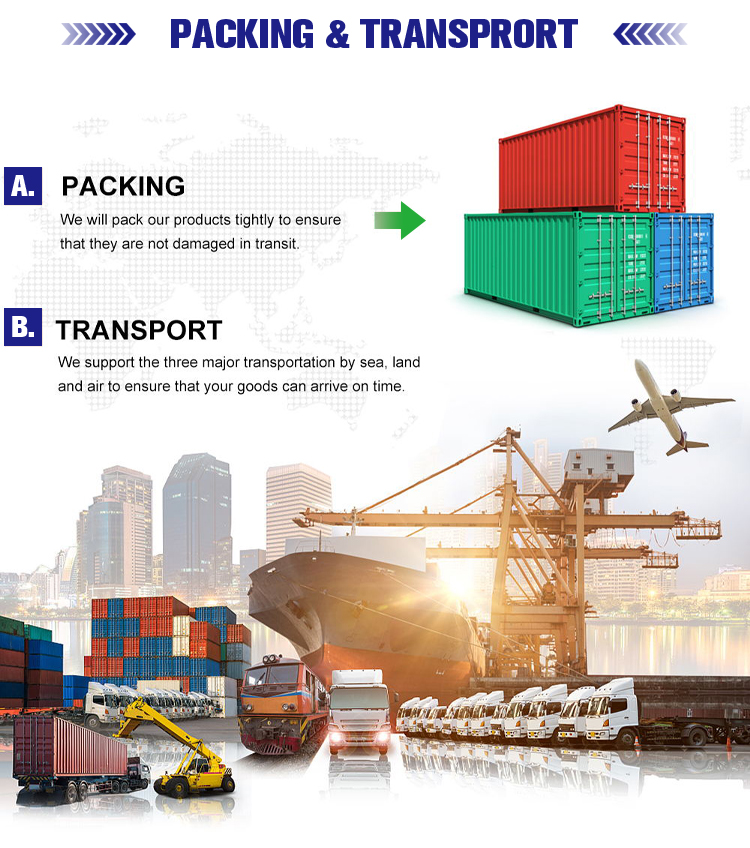

7KW EV Charger Wholesale Manufacturer In China
A 7KW EV Charger is an Electric Vehicle charging station designed to recharge electric cars and plug-in hybrids. The “7kW” refers to the charging power it can deliver, which is 7 kilowatts. This type of charger is known as “Level 2” charging and is faster than standard household outlets, making it a practical choice for residential and some commercial charging needs.
Key features of a 7KW EV Charger include its versatility, compatibility with most modern electric vehicles, and the ability to charge an EV faster than using a regular wall socket. Installing a 7KW EV Charger at home can significantly reduce charging times, allowing EV owners to top up their vehicle’s battery conveniently overnight or during extended parking periods.
Overall, a 7KW EV Charger provides a balance between charging speed and convenience, making it a popular and efficient charging solution for electric vehicle owners.
Related Products
Related Articles
Frequently Asked Questions
How fast is a 7KW EV Charger?
A 7KW EV Charger is significantly faster than a standard household outlet for charging electric vehicles. It can charge your EV at a rate of up to 7 kilowatts, which means it’s about 3 to 4 times quicker than using a regular wall socket.
To give you an idea of the charging time, it might take around 4 to 8 hours to fully charge your electric vehicle with a 7KW EV Charger, depending on the battery capacity and how much charge your EV already has. This makes it much more convenient and time-efficient, especially for daily use or when you need to top up your vehicle’s battery during extended parking periods.
So, in simple terms, a 7KW EV Charger is a reliable and faster option for charging your electric car, making it a popular choice for both residential and commercial charging stations.
What does 7KW EV Charger mean?
A 7kW EV charger refers to an Electric Vehicle (EV) charging device that can deliver a charging power of 7 kilowatts. It’s a type of charging station specifically designed to recharge electric vehicles at a faster rate compared to standard household outlets.
The “kW” stands for kilowatts, which is a unit of power. In this context, 7 kilowatts means the charger can supply a charging rate of 7,000 watts. To put it simply, it’s like having a more powerful charging station for your electric car.
Using a 7KW EV Charger is beneficial because it reduces the time needed to charge your electric vehicle’s battery compared to slower chargers. It’s typically considered a Level 2 charger, which is commonly found in residential settings and some commercial locations. This type of charger is suitable for many modern electric cars and plug-in hybrids.
So, when you see a 7KW EV Charger, it means you have access to a charging station that can provide a faster and more efficient way to charge your electric vehicle, making it a practical choice for everyday use and convenient for keeping your car’s battery topped up.
How many kWh does a 7KW EV Charger use?
A 7kW charger will use a certain amount of energy, measured in kilowatt-hours (kWh), depending on how long it is actively charging an electric vehicle.
To calculate the energy consumption, you can use the following formula:
Energy (kWh) = Power (kW) x Charging Time (hours)
For example, if you use a 7kW charger to charge your electric vehicle for 2 hours, the energy consumption would be:
Energy (kWh) = 7 kW x 2 hours = 14 kWh
So, in this scenario, the 7kW charger would use 14 kilowatt-hours of energy to charge the electric vehicle for 2 hours. The actual energy consumption will vary based on the charging time and the charging power of the charger.
Can I install 7KW EV Charger at home?
Yes, you can install a 7kW EV charger at home, provided you have the necessary electrical infrastructure to support it. Installing a 7kW charger is a popular and practical choice for many electric vehicle owners who want a faster and more efficient way to charge their cars at home.
However, before proceeding with the installation, there are a few essential considerations:
Electrical Capacity: Check if your home’s electrical system can handle the additional power demand. A 7KW EV Charger will require a dedicated electrical circuit with the appropriate amperage and voltage. It’s advisable to consult with a licensed electrician to assess your home’s electrical capacity and make any necessary upgrades.
Installation Requirements: Installing a 7KW EV Charger typically involves mounting the charger on a wall or charging pedestal in a suitable location, such as a garage or carport. Ensure that the installation complies with local building codes and safety regulations.
Charger Compatibility: Verify that the 7KW EV Charger you choose is compatible with your electric vehicle model. Most modern EVs support Level 2 charging, which includes 7kW chargers, but it’s essential to check the specifications to ensure compatibility.
Permits and Approvals: Depending on your location, you may need to obtain permits or approvals from local authorities before installing the charger. Be sure to follow the necessary procedures to comply with local regulations.
Professional Installation: While some EV charger models allow for DIY installation, it’s strongly recommended to have a professional electrician handle the installation. This ensures safety and proper electrical connections.
Cost: Consider the cost of the charger itself, installation fees, and any potential electrical upgrades needed for your home.
Installing a 7KW EV Charger at home can be a convenient and practical solution for charging your electric vehicle. It reduces charging time significantly compared to standard household outlets, making it more suitable for daily use and ensuring your vehicle is ready to go when you need it. However, ensure you take the necessary precautions and consult with professionals to have a safe and efficient installation process.
Should I get 3.6 kW or 7KW EV Charger?
Choosing between a 3.6kW and a 7kW charger depends on your specific needs and circumstances. Let’s break down the considerations to help you make an informed decision:
1. Charging Speed: The primary difference between the two chargers is their charging speed. A 7kW charger is faster than a 3.6kW charger. If you prioritize quicker charging times, the 7kW charger will be more suitable, especially if you frequently drive long distances and need to charge your electric vehicle more rapidly.
2. Electrical Infrastructure: Assess your home’s electrical capacity. Installing a 7kW charger requires a higher electrical capacity compared to a 3.6kW charger. If your home’s electrical system can handle the extra power demand and you have the necessary electrical upgrades in place, then a 7kW charger is a viable option.
3. Daily Usage and Driving Habits: Consider your daily driving habits and charging needs. If you mainly use your electric vehicle for short commutes and have enough time to charge overnight or during extended periods of parking, a 3.6kW charger may be sufficient. On the other hand, if you rely heavily on your electric vehicle and need quicker charging turnarounds, the 7kW charger would be more beneficial.
4. Vehicle Compatibility: Check if your electric vehicle supports Level 2 charging, which includes both 3.6kW and 7kW chargers. Most modern EVs are compatible with Level 2 charging, but it’s essential to verify your specific vehicle’s charging capabilities.
5. Budget: Consider the cost of the charger itself and any potential electrical upgrades needed for installation. Generally, a 7kW charger may be more expensive than a 3.6kW charger, but the price difference varies based on brands and features.
In summary:
Choose a 3.6kW charger if you have a limited electrical capacity, don’t need rapid charging, and are looking for a more budget-friendly option.
Choose a 7kW charger if you have a higher electrical capacity, want faster charging times, and are willing to invest in a more powerful and efficient charging solution.
Ultimately, the decision should align with your specific needs, driving patterns, and available electrical infrastructure. If you’re unsure, consider consulting with an electrician or EV charging expert who can assess your situation and provide tailored recommendations.
Is a 22kW charger faster than a 7kW?
Yes, a 22kW charger is faster than a 7KW EV Charger in terms of charging speed. The “kW” in both cases stands for kilowatts, which represents the charging power output of the charger.
A 22kW charger can supply a charging rate of up to 22 kilowatts, while a 7KW EV Charger can provide a charging rate of up to 7 kilowatts. Therefore, the 22kW charger is significantly more powerful than the 7KW EV Charger.
Using a 22kW charger can result in much faster charging times compared to a 7kW charger. For example, if both chargers were used to charge an electric vehicle with the same battery capacity, the 22kW charger would charge the vehicle at a rate roughly three times faster than the 7kW charger.
However, it’s important to note that the charging speed also depends on the electric vehicle’s onboard charging capabilities. Some electric vehicles may not be able to fully utilize a 22kW charger’s maximum power output, while others can take advantage of the higher charging speed.
In summary, a 22kW charger is faster than a 7KW EV Charger, making it a desirable option for those who want to minimize charging time and have an electric vehicle that can take advantage of the higher charging power.
